-
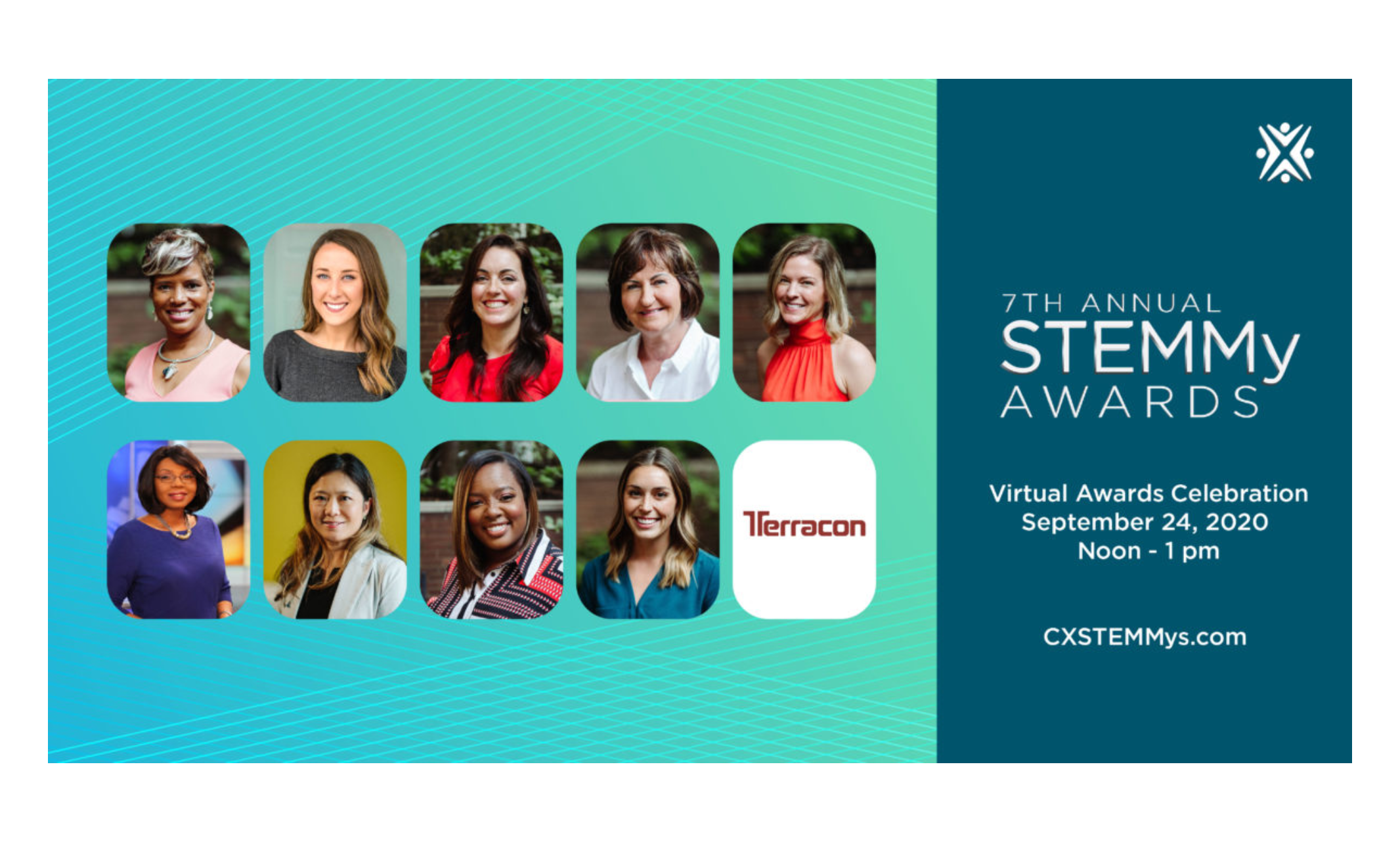
School of Computing and Engineering alumni and board member received STEMMy awards from Central Exchange
The 7th annual STEMMy Awards hosted by Central Exchange highlighted a host of women in STEM who are blazing trails and breaking barriers in the fields of science, technology, engineering and math. In true UMKC fashion, several of this year’s honorees are Roos hailing from the School of Computing and Engineering.
Sherry Lumpkins (BACS ’93), owner and principal of Blue Symphony and 2020 Vanguard Award recipient – Enterprising Innovator
Lauren Koval (BSCE ‘ 17), engineering manager at McCownGordon Construction – Rising Trendsetter
Emily Tilgner, civil and mechanical engineering advisory board member, vice president of engineering services at McCownGordon Construction – Groundbreaking Leadership
Our award recipients shared their passions for computer science and engineering, the importance of networking and how they contribute to closing equity gaps in STEM.
What sparked your interest in engineering?
Lumpkins: I stumbled upon it as a career option. Computers weren’t ubiquitous when I was in high school. I took one class and thought it was interesting but didn’t think about it as a career path until I had an internship in college where I worked on a computer. When I began diving deeper into how computers were made and I found that I wanted to learn more and eventually switched majors from accounting to computer science.
Tilgner: I always loved math and science classes and really loved puzzles and problem-solving. My parents, who were both educators, helped me explore areas of study that they thought would be a good match. Engineering was a great fit for me.
Koval: In junior high school, my advanced algebra teacher, Mrs. Docking, invited a woman engineer into our class to speak to us about her career. Listening to her speak really sparked my interest and from that day I decided I wanted to pursue engineering!
How did UMKC prepare you for the career you lead today?
Lumpkins: It was there that I decided to pursue a career in STEM, and I absolutely got great fundamentals that equipped me to be able to keep up with the changing pace in computer science.
Koval: I had a great deal of support during my time at UMKC! In addition to studying Engineering, I was also a Trustees’ Scholar and played on the Women’s Soccer Team, so I stayed pretty busy. Each of those areas of my life required a lot of time and dedication, but they also provided me with a lot of help and support. I learned to work hard and push myself, and also when to ask for help and guidance. I’m thankful for the life lessons I learned and have carried into my career.
"It used to be 'it’s not what you know, but who you know.' I’ve heard a more recent take of this, 'it’s not what you know or who you know, but who knows you.'” - Tilgner
Why is it important to mentor and help give back to future engineers?
Tilgner: I believe the earlier we can support women in this field, the better the chance for retaining them. Through various experiences mentoring youth and students, I’ve found that just having a trusted advisor, someone to talk to, or just knowing that someone has gone through that same thing, who can understand your point of view, provides support for young women pursuing this career.
How do you help to close equity gaps in STEM?
Lumpkins: I very intentionally want to use the internship opportunities I have available to address the equity gaps. I can’t solve all the problems in the world, but I can do my tiny piece. When I started the Blue Symphony internship program, I wanted to create an opportunity for underserved groups – students of color and women – and I try to be very instructive to help equip students for experiences they’ll have in their careers. I want to give them skills they can add to their resume.
Tilgner: The fact that my engineering team within a construction company is majority female speaks louder than any story I could tell or any metric I could list. To support and nurture women, you have to hire them first and give them a platform in which to shine. In addition to this role, I push for multiple women in my company to be nominated for various awards, leadership programs, and to be recognized for promotions and prestigious projects. We are getting closer to 50% representation in these opportunities, which I believe will help our company come closer to an executive leadership team with the same ratio. I believe it is not enough to only support the women. Creating a dialogue with my male colleagues and industry partners about equal opportunities and representation can exponentially expand the opportunities for everyone.
"Seeing women, and Black women, recognized in STEM fields shows little girls that if someone who looks like them can do it, they can do it." - Lumpkins
Why is it important to network and make connections as you build your career?
Tilgner: It used to be “it’s not what you know, but who you know.” I’ve heard a more recent take of this, “it’s not what you know or who you know, but who knows you.” You can never know what conversation or contact is going to help you along the way. Not every relationship should be viewed as transactional, but why not give yourself every opportunity on the way?
Koval: Networking and making connections play a huge part in the success of your career. I was very fortunate to form many connections while at UMKC through my time in the Trustees’ Scholars program, one of which led to my internship and now career at McCownGordon Construction! Forming relationships with people both inside and outside of my company has helped me gain knowledge and make connections that make my job both more rewarding and more fun! It has also allowed me to meet and help others within the same and different industries. It is amazing what a small world it is, once you are willing to put yourself out there and meet new people.
"I very intentionally want to use the internship opportunities I have available to address the equity gaps. I can’t solve all the problems in the world, but I can do my tiny piece." - Lumpkins
Sherry, what has your journey been like starting and growing a Black/woman-owned technology company in Kansas City?
Lumpkins: I think that being an entrepreneur has its own set of struggles, so adding on being a woman and being Black there is three-times the challenge, but those things shouldn’t be prioritized. It’s important to be aware of those things but you’ve got to do what you’ve got to do. When I walk into a room, I’ve had to figure out how to make people listen to me but those are the cards I’m dealt, and it’s been worth it. Once you’ve proven that you know what you’re talking about, it’s done.
Women weren’t always able to pursue careers in STEM, let alone receive credit for their innovation and leadership. What does this recognition mean for you?
Tilgner: It is huge, but it is not enough. In the words of Ruth Bader Ginsberg: “When I'm sometimes asked ‘when will there be enough (women on the Supreme Court?)’ and I say, 'when there are nine,' people are shocked. But there'd been nine men, and nobody's ever raised a question about that.” I would like to get a point where women make up at least an equal percentage, if not more, in STEM fields because why not?
Koval: This recognition means so much to me. I am so thankful to all of the women who helped blaze the trail in the STEM fields, and I hope to do the same for those following me. It’s incredible to be recognized, but I really wouldn’t be where I am today without all of the people that helped and supported me throughout my education and thus far in my career. There are too many to name, but I want to say thank you to all of them and I plan to keep pushing on!
Lumpkins: This recognition is important. I’ve heard the story so many times where a young woman pursuing STEM is the only one in the classroom. I’ve heard women being inadvertently being chased away. I believe that with STEMMy, and with the Vanguard Awards, it’s a testament for young girls that they can do this. In their formative years, children behave more equally, but that kind of fades away around their middle school years. But seeing women -- and Black women -- recognized in STEM fields shows little girls that if someone who looks like them can do it, they can do it.
"
I’m thankful for the life-lessons I learned and have carried into my career." - Koval
What advice do you have for students wanting to follow in your footsteps?
Tilgner: Ask for advice but listen to yourself – you are going to have to forge your own pathway and it will be as unique as you are. Create a support system not just personally but professionally. Find people that will be honest with you. Know that you deserve what you want just as much as anyone else but don’t put others down in order to build yourself up. Last but not least, in your way, don’t forget to help those ladies next to and behind you.
Lumpkins: Do it! Be aware but not discouraged. Be willing to learn all your life. The STEM field is HUGE, there’s no one kind of field. Don’t assume that because you have different interests you can’t pursue the career you want.
Koval: Work hard, stay motivated even on the tough days, develop as many relationships as possible, and don’t be afraid to ask for help! Something I have to tell myself (probably daily) is that mistakes are going to happen, and as long as I gave it my all, the rest is out of my hands. That’s hard to practice for most of us with an “engineering-mind,” but I find that the people who are most successful in my company and in other companies aren’t afraid to make a mistake because they know they will learn from it and are at least willing to try a new approach when needed.
Sep 30, 2020
-

Machine used in eye exams could lead to earlier diagnosis and treatment
Technology used in eye exams called microperimetry could prove to be an effective, non-invasive method of identifying early symptoms of multiple sclerosis.
An article recently published by researchers at the UMKC School of Medicine Vision Research Center reports the effective use of microperimetry during routine clinical assessments of multiple sclerosis patients. The article appeared in the research journal BioMed Central Ophthalmology.
Multiple sclerosis is a disease of the brain and spinal cord that affects nearly 400,000 people in the United States and more than 2 million throughout the world. There is no known cure for the potentially disabling disease, but treatment can help manage symptoms and speed up recovery from attacks.
Therefore, a non-invasive, clinically relevant and cost-effective method of identifying damage early would be invaluable to patients and health care providers. It would enable prompt therapy that may slow the progression of the disease and its ocular manifestations before irreversible damage occurs.
The testing method studied by the team of UMKC researchers, students and residents, microperimetry, measures light sensitivity of the center of a patient’s vision and can detect specific areas of decreased sensitivity. It typically takes less than half an hour.
Researchers from the school’s Vision Research Center have previously found the technology to be effective in diagnosing early stages of other diseases of the nervous system such as mild cognitive impairment in Alzheimer’s.
The vision research team of Landon J. Rohowetz, Qui Vu, Lilit Ablabutyan, Sean M. Gratton, Nancy Kunjukunju, Billi S. Wallace and Peter Koulen collaborated to determine subtle changes in visual function related to otherwise undetectable signs of multiple sclerosis. It is the first peer-reviewed study to assess the use of microperimetry, a straightforward and non-invasive vision test, as a tool to detect disease progression in early stage multiple sclerosis patients.
“The findings from this study provide a rationale for the use of microperimetry in the clinical assessment of patients with multiple sclerosis,” said Rohowetz, the study’s lead author. “By identifying visual dysfunction associated with multiple sclerosis, we hope physicians and researchers are able to use this technology to ultimately preserve and improve quality of life for patients with this often-disabling disease.”
More than 80 percent of the patients with multiple sclerosis show signs of impaired vision and 73 percent of MS patients experience visual impairment within the first 10 years of diagnosis, which is comparable to the prevalence of abnormal or impaired muscle function in the disease.
This initial study indicates that light sensitivity measured by microperimetry is lower among multiple sclerosis patients who have otherwise normal vision and no other history of issues with the optic nerve, which connects the eye to the brain. It also revealed a significant correlation between this impaired function and a reduced thickness of the retina in MS patients that is not seen in control subjects.
The report says further studies would look to monitor and evaluate ongoing changes in retina sensitivity and thickness as they correlate to a progression of multiple sclerosis. It will also broaden the approach to include MS patients who have a history of optic neuritis, where measurable damage to the optic nerve has already occurred.
Sep 30, 2020
-
Truman Fellows program provides jobs for recent alumni, legal services for community
The School of Law at the University of Missouri-Kansas City has launched a new program to provide training for recent graduates to further develop their legal skills in a supervised practice setting, while providing legal services that advance the public interest.
The grant-funded Truman Fellows program has created three full-time short-term positions at law-school-affiliated entities that are being filled by May 2020 graduates of the school’s Juris Doctor program. The program was launched to provide opportunities for recent graduates in the midst of the COVID-19 recession while building on the law school’s strong commitment to public service.
The funded positions are providing services to people in the community adversely affected by the pandemic. One of the fellows will be working with the school’s Entrepreneurial Legal Services Clinic to provide advice and assistance to small businesses and start-ups that have been adversely impacted by the pandemic. A second fellow will be working in the school’s Self-Help Legal Clinic to help educate those who are facing evictions and other legal problems from the pandemic. The third fellow will work with the UMKC School of Law’s Digital Initiatives team to develop an online system to help those threatened by domestic violence to obtain restraining orders.
The program has been launched with a $25,000 grant from the Kansas City Regional Covid-19 Response and Recovery Fund. Law school officials are seeking additional grant funds to continue the program.
The name of the program honors one of the school’s most illustrious former students, said Jeffrey E. Thomas, associate dean for international affairs and Daniel L. Brenner faculty scholar and professor of law, who helped set up the program. President Harry S. Truman attended the Kansas City School of Law for two years (1923-1925).
“We were looking for a name that would connect to the geographic area, public service, and a commitment to justice,” Thomas said, and Truman was an easy choice for the program’s namesake and role model.
“This program builds on the UMKC law school’s strong commitment to public service. Last year, the school’s clinician and field placement programs provided more than 38,000 hours of service to the community, and 83 students provided 8,500 hours of pro bono service at 32 sites,” Thomas added. “The Self-Help Clinic provided assistance to 700 clients last year, and the Entrepreneurial Legal Services Clinic provided assistance to dozens of small businesses.”
Sep 29, 2020
-
KC Studio features UMKC College of Arts and Sciences interim dean and professor of Studio Art
Kati Toivanen has two passions -- running and photography. She finds numerous parallels between the two. “There’s an art and science to both art and running,” she said. “Running is very physical. It’s also very mental. At the end of the race, it’s really your mind that carries you.” Read the full article.
Sep 29, 2020
-
School of Law professor co-authors article in national publication
Nancy Levit, associate dean and UMKC School of Law professor, was co-author of an article in The Conversation about state budget shortfalls and the impact on women.
Sep 29, 2020
-
Beth Vonnahme continues to led expertise to local media
“This is not a normal campaign. We don’t have big campaign rallies. We don’t have the in-person campaigning where you’re going door to door, meeting in small groups. That’s been a big problem for the candidates,” Beth Vonnahme said. “So this is really the first time they’ve had a chance to engage on a national stage with each other.” Read the article by Fox4KC or watch the newscast. She was also interviewed by KCUR about local elections in Missouri.
Sep 29, 2020
-
Sharing traditions, resources and what the month means to them
Each year, we observe National Hispanic Heritage Month from Sept. 15 to Oct. 15. It’s a time of celebration and recognition of the cultures, histories and contributions of the American Hispanic community.
Hispanic Heritage Month also includes the independence days of several Latin American countries, including Costa Rica, El Salvador, Guatemala, Honduras, Nicaragua, Mexico and Chile.
We recently spoke with three UMKC alumni about their traditions, resources and what the month means to them.
Meet our alumni, pictured below from left to right:
Veronica Alvidrez (M.S.W. ’11), experience manager, Startland
Susana Elizarraraz (B.A. ’15), chief community officer, Latinx Education Collaborative
Edgar Palacios (B.M. ’08), president and chief executive officer, Latinx Education Collaborative
What does Hispanic Heritage Month mean to you personally?
Veronica Alvidrez: For me, Hispanic Heritage Month is a time to consciously reengage with my culture. Although my culture is always with me, it is not always at the forefront. This time of year allows me to dig in and reconnect with a big part of what makes me, me.
Susana Elizarraraz: It personally gives me an opportunity to reflect on what my current opportunities are and how they are due to the many sacrifices people made before me. This includes my freedom, my opportunity to get an education, my opportunities to have ownership of land and property — all of these were denied from my ancestors at various points in history. Though I appreciate these sacrifices all of the time, Hispanic Heritage Month encourages me to pause, reflect and be grateful for those who came before me that made my life today possible.
Edgar Palacios: Hispanic Heritage Month is a time to celebrate and elevate the voices and contributions of the Hispanic community. Hispanic/Latinx folks make up 17% of the U.S. population and still are severely underrepresented in positions of influence and decision-making. It's also a time to celebrate various independence days of Latin American countries and honor the sacrifices of our ancestors.
Are there ways you celebrate? Traditions?
Alvidrez: We like to celebrate our culture with many carne asadas and gatherings during this time of year. My mother enjoys gathering us for a night of Lotería.
Elizarraraz: Hispanic Heritage Month is a tradition in the United States, so as a family, we didn’t follow any celebrations or traditions particular to the month. However, Mexican Independence Day lands during the month, Sept. 16, and my family recognizes that. As children, we didn’t have much to be able to celebrate, but as an adult, I’ve begun to appreciate my heritage more and recognize the dates that are significant to my identity. My identity has been something that I’ve had to learn more about in my adulthood, so many of the celebrations and traditions held by my people are new to me as well. Recently, it has been important for me to recognize those traditions to give homage to the strength and pride that they showcase.
Palacios: This year, I 've been celebrating by adding the Nicaraguan flag to my Zoom background. It typically gives me the opportunity to share about Hispanic Heritage month and about my Nicaraguan roots.
Are there resources in Kansas City or at UMKC that you recommend for people wanting to connect with the Hispanic community?
Alvidrez: Given the current state of our country due to COVID-19, I do not know of any places that one can visit to reconnect. With that said, I do enjoy visiting Café Corazón when I feel the need to fill my cup with our culture and all its color.
Elizarraraz: One organization that comes to mind right away is the Hispanic Development Fund and their partnership with UMKC Multicultural Student Affairs with Avanzando. Hispanic Development Fund awards thousands of dollars in scholarships to Latinx students every year. For many students, including myself, having scholarships like these are the determining factor of whether or not college is accessible. Avanzando, led by Iván Ramírez, is the program that derived from HDF at UMKC. It provides mentorship opportunities for the scholarship recipients, which is a life-changing experience as well.
In addition, I’d encourage people — especially artists — to check out the Latino Arts Foundation, led by Deanna Muñoz. The Latino Arts Foundation is doing great work in establishing a place for Latinx artists and others, which doesn’t currently exist in Kansas City.
Palacios: Kansas City has a rich and diverse Hispanic community. I recommended reaching out the following organizations or institutions: El Centro, Inc., Guadalupe Centers, Hispanic Development Fund, Mattie Rhodes Center, Latinx Education Collaborative, Hispanic Chamber of Commerce of Greater Kansas City, Greater Kansas City Hispanic Collaborative, KC Hispanic News, and Dos Mundos.
Sep 28, 2020
-
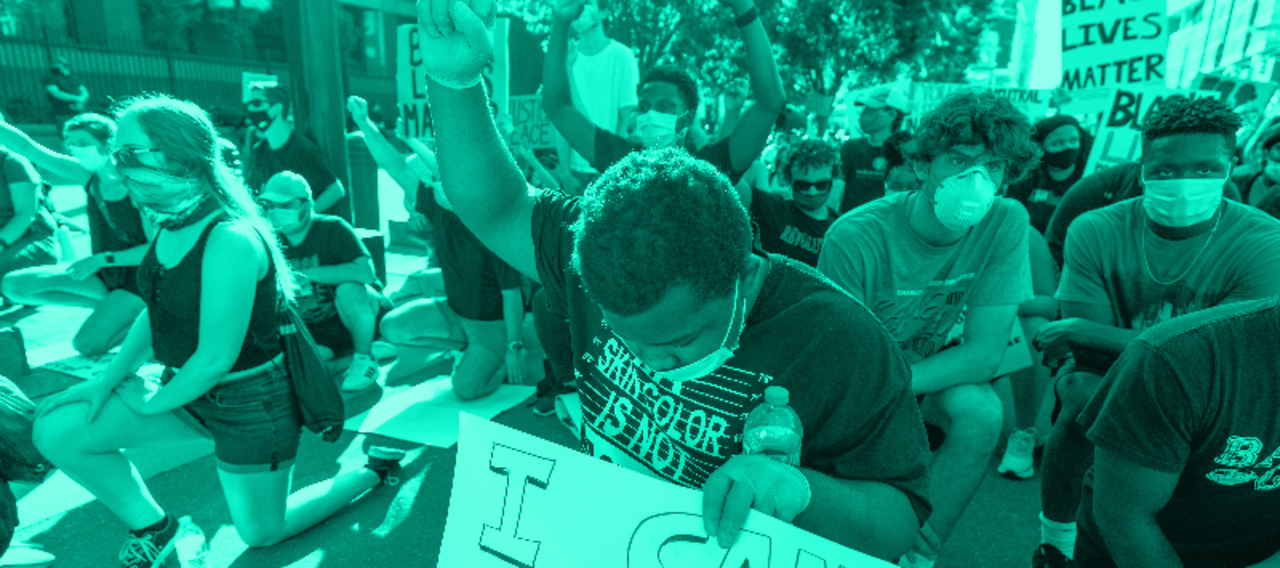
Panelists address the history of systemic racism and the struggle in America today
The Color of Money: Racism in Finance, presented on Sept. 17, was the fourth installment in the Critical Conversations series sponsored by the office of University of Missouri-Kansas City Chancellor Mauli Agrawal and the UMKC Division of Diversity and Inclusion.
Participating panelists included:
Gary O’Bannon (co-moderator), executive-in-residence, Henry W. Bloch School of Management and former director of human resources, City of Kansas City, Missouri
Lisa Uhrmacher (co-moderator), UMKC Bloch student, IoT and analytics practice lead, Atos
Ruben Alonso, president, AltCap
Victor Hammonds, director of small business banking, First National Bank of Omaha
Nathan Mauck, associate professor of finance, Henry W. Bloch School of Management
Nick Richmond, president and CEO, Kansas City Credit Unions
Critical Conversations is part of the Roos Advocate for Community Change, UMKC leading thoughtful action on campus and in our community to ensure lasting and comprehensive change.
The United States continues to struggle with its history of systemic racism, and that struggle is expressing itself in nearly all areas that make America what it is—the political system, corporate America, entertainment, athletics, social media and the police and criminal justice systems.
“The financial services industry has a responsibility in considering their role in this movement both in how we got there and how to work to achieve an equitable and inclusive financial system,” O’Bannon said. Of the systems that contribute to disparities in wealth, he started with employment.
“It is impossible to build wealth without steady and rewarding jobs,” O’Bannon said. “But minority unemployment is consistently twice that of whites no matter what the economy.”
Education is another system impacted. O’Bannon said Black and Hispanic children’s opportunities and choices are more limited than any other group.
Regarding the health care system, O’Bannon said repeated studies have found doctors and medical facilities have unconscious racial biases when it comes to minority patients.
The fourth system discussed was housing and redlining, barring Black and brown people from living in certain areas.
“It is still present today,” O’Bannon said of redlining. “These systems remain broken and won’t be corrected soon. So perhaps the question today is whether financial services companies and its professionals that run them, will be a part of the solution.”
Before the group delved into the role financial institutions have in being part of the solution, Uhrmacher led a discussion on Kansas City’s own history.
“We know that wealth is something that’s handed down from generation to generation primarily through home ownership,” Uhrmacher said. “And if you think about it, it’s the way that much of our wealth is transmitted from one generation to the next. For every one dollar that is passed along generationally in a Black family, 10 dollars are passed along in a white family.”
In many instances, according to Uhrmacher, the crux of the issue in terms of finance, comes down to home ownership. In her research of Kansas City housing, she found the city wasn’t always segregated. J.C. Nichols was a proponent of the covenant neighborhood concept in Kansas City, a concept that spread nationally. Redlining, which began in the 1920s, was the drawing of red lines on maps indicating where financial institutions would not provide home loans. The practice of redlining effectively segregated Black and white neighborhoods.
Mauck presented national trends on all of the systems and discussed wealth inequality from an educator and researcher’s perspective. According to the Institute for Policy Studies, Mauck said the gap in wealth grew between 1983 to 2016, with many drivers of wealth inequality going back to housing.
“This gap has been very persistent over time,” Mauck said. Levels of education is also something Mauck has examined. He cited a St. Louis Federal Reserve wealth report regarding college education and the wealth gap as he discussed the disparity in net worth and holding of assets among minorities. He said the gap in financial literacy levels impacts lending and who receives it.
Alonso also addressed racist constructs that prevent people of color from accumulating assets. He said lending is based on qualifying borrowers through their personal credit and assets. If the most common form of collateral for lending is real estate, and if there is a subset of the population that can’t get housing because of other discriminatory practices, Alonso said accessing capital is limited.
“That is a continual challenge for entrepreneurs of color,” Alonso said, which negatively impacts the number of minority-owned businesses. Compared to white families, he said all other races have lower levels of income and net worth and are less likely to hold assets of any type. In fact, Alonso said 19% of Black families have zero or negative net worth, while only 9% of white households have no wealth.
Richmond, as president and CEO of a credit union, said they try to help their customers and will often discuss financial literacy issues. For example, Richmond said there have been generations of Blacks watching their parents and grandparents get money orders to pay their bills. Richmond said he advises customers that it’s better to save the money order fee and get checks.
“However, it’s hard to break generations of habits with money,” Richmond said. He would like to see banks partner with schools, school districts and universities in educating community members on financial literacy so they can break the cycle of making bad financial decisions.
Hammonds said as a banker he also sees people who can’t get value out of their homes and builders who can’t build houses at a valuable price point in underserved areas. He said gentrification of neighborhoods also makes homes too expensive.
“When you’re in an underserved community…you can’t get value out of your home,” Hammonds said.
So, what is the financial industry doing to make progress to include communities of color? The panelists agreed that the desire to help and find ways to best serve the people in their communities is how they can make progress.
Alonso said Community Development Financial Institutions (CDFIs) are great partners because they don’t have the limitations/regulations on lending rates and terms. These organizations may be good options for minorities.
Representation matters. Like most systems that provide the opportunity to build wealth in this country, the underlying cause for a lack of substantive progress may be that leaders and industry decision-makers don’t see the barriers to entry, because they haven’t experienced them. And, unfortunately, the people negatively impacted aren’t represented. While every company in the S&P 500 Index now has a woman on the board, Uhrmacher said the same is not true in terms of racial diversity. An example is that only about 10% of the Russell 3000 Index has ethnically diverse board members.
When asked what the industry can do so their boards and leadership teams represent the communities they serve, Hammonds said it is something every company must be intentional about. The key is to start.
One of the last topics discussed was the responsibility that should be placed on educational institutions to push the narrative of financial literacy, address income inequality and the racial wealth gap.
“Education is a good place to help bring attention to this,” Mauck said. Education can be delivered in a number of different ways including K-12 education, college, community workshops, bank and financial institution education sessions and mentorship.
Uhrmacher said investments with traditional institutions and investment managers that promote Environmental, Social, Governance (ESG) and socially responsible investing has recently become popular. And while there’s good intentions, she said some say they may actually be inadvertently causing social, economic and environmental harm. She suggested a better option may be to offer both restorative and regenerative investment solutions.
“As an organization you have to listen to the voice of your customer,” Hammonds said. “Be sensitive. Cross all of the areas of ESG. Be aware of the social impact your organization can have.”
A third session on the future of policing is scheduled for Oct. 5, The Future of Policing in Kansas City: A Conversation with Mayor Quinton Lucas.
Watch the discussion in its entirety below and check-in on the original story for the next sessions, which includes A Dialogue Among Women of Color and White Women in Higher Education on Oct. 7.
Sep 28, 2020
-
Political science professor provides insight into Missouri House race
“What makes the Missouri Legislature interesting is there are huge issues, so people should pay attention,” said Beth Vonnahme, assistant professor of political science at the University of Missouri-Kansas City. Read the article by Lynn Horsley.
Sep 27, 2020
-
Chris Garmon provides insight for KCUR article
Chris Garmon, assistant professor of Health Administration at Bloch School, has worked on antitrust investigations at the Federal Trade Commission. He said even prices for common services, such as MRI scans, can be maddeningly difficult to compare. Read the full article.
Sep 26, 2020
-
UMKC student shares how every donation given through Oct. 15 will be matched by the Hispanic Development Fund
Daisy Garcia Montoya received support from the Hispanic Development Fund. Now, she’s raising money for scholarships for undocumented students at UMKC as part of HDF’s Cambio Para Cambio campaign or change for change. Read the KSHB story and watch the newscast.
Sep 25, 2020
-
Sean O’Brien provides reaction to KCTV5 and Diverse: Issues in Higher Education
Sean O’Brien, UMKC School of Law professor, who is part of a team to free the wrongly convicted, says it would be hard to argue what happened was murder, as many upset by the decision say it should be. But he says it is a clear example of why law enforcement tactics should be re-examined. Read the full story and watch the news report. Read continued coverage and an interview with Diverse.
Sep 23, 2020
-
Fox4KC talks to UMKC School of Law professor about the death of Supreme Court Justice Ruth Bader Ginsburg and the twist it brings to the presidenti...
David Actenberg said Ruth Bader Ginsburg was the type of judge that we don’t see much of today. Replacing her could bring a big shift in the high court. Read the story and watch the news segment.
Sep 23, 2020
-
Whitney Terrell’s 2005 novel inspired by Nichols Company racial covenants speaks to moment
KC Studio recently interviewed Whitney Terrell, associate professor in the UMKC Creative Writing Program, about his 2005 novel that tells the story of the racial covenants used to build a segregated suburban empire.
Sep 23, 2020
-
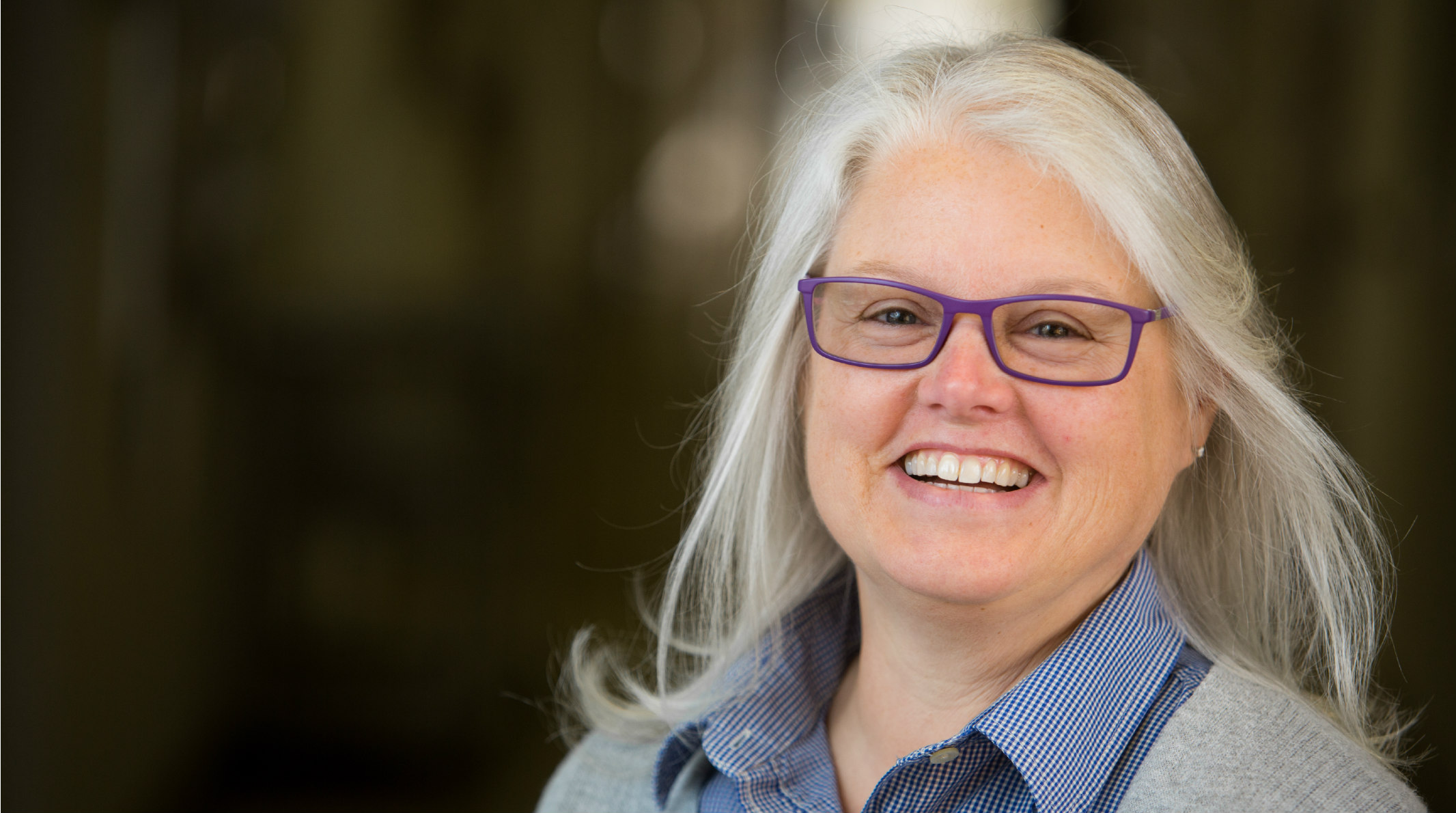
Biology professor goes the extra mile with student advising
Effective student advising is more than checking boxes on a worksheet. To honor the significance of advising students, the Missouri Academic Advising Association (MACADA) recognizes achievements in the field. This year, the association honored Tammy Welchert, associate teaching professor, director of academic advising, with the Outstanding Academic Advising Award for Academic Advising Administrator.
“Dr. Welchert has been a long-time champion of advising and the MACADA organization, including serving on our MACADA Executive Board as our Liaison Coordinator from 2006-2008, and our Kansas City Representative from 2005-2006,” says Bethany Jordan, MACADA president-elect. Welchert also served as President of MACADA from 2009-2010.
Jordan says the nominations and awards serve as a recognition from colleagues who have identified these individuals as champions of advising who strives to make an impact in the field.
"Advisors make a difference in the lives of their students every single day. We empower them to be independent, confident professionals." – Tammy Welchert
“Her letters of support spoke volumes about the role she continues to play to improve academic advising on the UMKC campus.”
Welchert is living what she learned. She is the product of strong academic advising.
“I didn’t start college until five years after I graduated from high school,” Welchert says. “I was married and had a young daughter. In my first term my biology professor, Dr. Albert Gordon, might have recognized me as a non-traditional student and perhaps that caught his eye. It was a fairly small class and I did well. He would stay in the lab and talk to students before and after class and we got to know each other. He took me under his wing and guided me throughout my undergraduate degree. We still stay in touch and trade Christmas cards to update each other on our lives every year.”
Welchert has carried that model of mentoring forward. She sees advisors as students’ success coaches, cheerleaders and parents away from home.
“Advisors make a difference in the lives of their students every single day,” she says. “We empower them to be independent, confident professionals.”
But beyond being willing to listen, laugh and advise, Welchert aims to inspire students to be happy, confident and prepared for the next steps of their journey.
“Our students inspire me every day with the incredible talent they bring,” she says. “Some of them just need someone to believe in them to tip the scale that allows them to bloom.”
That someone is often Welchert, who has a box filled with students notes of gratitude that she refers to as her “sunshine file.”
“It’s filled with cards and letters from students over the years thanking me for being there for them, for believing in them when they couldn’t believe in themselves. Advisors make a difference in the lives of their students every single day. We empower them to be independent, confident professionals.”
Welchert is looking forward to connecting with her colleagues at this year’s MACADA virtual conference.
“In my new position as director for academic advising at UMKC there will be more reasons than ever for us to find ways to partner to support our advisors.”
“Dr. Welchert has been a long-time champion of advising and the MACADA organization,” Jordan says. “We thank her for all her hard work, and congratulate her on a well-deserved recognition.”
Sep 21, 2020
-
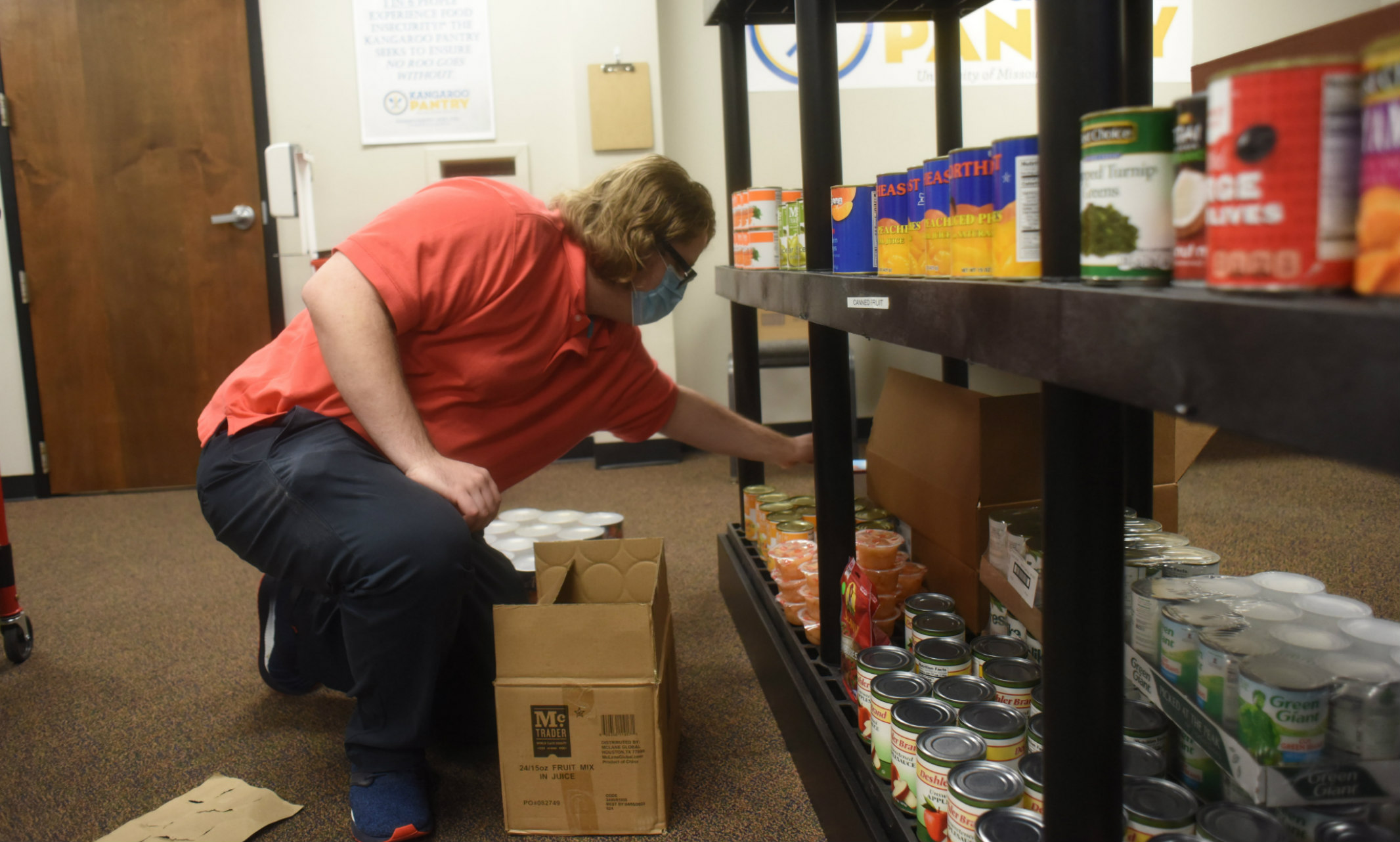
Satellite Kangaroo Pantry locations suggested for Volker and Health Sciences campuses
Since opening five years ago, Kangaroo Food Pantry has given UMKC students, faculty and staff access to food. Then the pandemic hit, and the demand has more than doubled.
With the growing need, Chancellor Mauli Agrawal formed a food security task force charged with finding gaps and finding solutions. The group studied best practices at other universities, analyzed campus survey data and held student focus groups.
“We made recommendations that are being implemented now and later this semester, but also determined future needs,” said Sue Agrawal, a co-chair of the task force and the chancellor's wife. “We want long-term solutions that make food accessible and convenient for our campus community.”
Based on the task force’s recommendations, this fall the Kangaroo Pantry, located at 4825 Troost Ave., room 103, extended its hours of operations from 6 to 12 hours per week, and expanded its offerings to include fresh produce. It also transitioned the pantry to operate as a full client-choice model so clients can shop as they would at a traditional grocery store.
The task force recommended that Kangaroo Pantry continue online request/pick-up option for students that was instituted during the COVID-19 pandemic in March, and to consider alternate locations for pick-up to make more convenient for students, such as Student Union. In addition, the group recommended establishing satellite pantry locations this fall on the Volker and Health Sciences District campuses.
"Anthony Maly, senior program manager in the Office of Student Involvement, and the Student Affairs team are making good progress and have already implemented several of the recommendations from the task force," said Sheri Gormley, a co-chair of the task force and director of strategic initiatives in the chancellor's office. "To build on this work, the chancellor has recently formed a food security advisory committee to prioritize recommendations from the task force and collaborate closely with our student affairs and student success teams to improve our students’ ability to access food and other basic needs.”
The group’s long-term recommendations:
Consider moving Volker pantry to more central location on Volker campus.
Develop permanent location on Health Sciences District campus.
Increase food offerings.
Expand operations to 40 hours or more per week.
Hire a full-time coordinator.
Institute comprehensive volunteer program to run food pantry.
Build new community partnerships and resource options for students experiencing food insecurity.
Create more food drives for the pantry.
Work in collaboration with UMKC Foundation to develop a comprehensive fundraising campaign with plan for outreach to local and national foundations.
Create a basic-needs center that would share space with pantry, which could contain school supplies and student resources.
Food security task force members are:
Sue Agrawal, co-chair, community volunteer
Obie Austin, co-chair, Student Health administrator
Sheri Gormley, co-chair, executive director of strategic initiatives, Chancellor’s Office
Debby Ballard, president of Sprint Foundation and UMKC Trustee
Stefanie Ellison, professor, associate dean for learning initiatives, School of Medicine
Sally Ellis Fletcher, associate dean for students, School of Nursing and Health Studies
Kellee Harris, assistant director, Multicultural Student Affairs
Kimberly Johnson, director of special projects, Chancellor’s Office
Ali Korkmaz, director of Institutional Research
Anthony Maly, senior program manager, Office of Student Involvement
Uzziel Hernandez Pecina, assistant teaching professor, School of Education
Gabriel Rop, director of programs and operations, Reconciliation Services
Leslie Tracy, residence hall manager, Residential Life
Katie Wiegand, graduate student, School of Social Work
Sep 21, 2020
-
Inside Higher Ed publication highlights UMKC work with prospective Latinx students
Since virtual channels make it possible to provide native-speaking representatives and break down cultural barriers, institutions can use digital platforms to connect with historically underserved groups of first-generation students and their families. A recent opinion article from Inside Her Ed gave UMKC as an example of this. UMKC reaches prospective Latinx students virtually with live remote bilingual chat office hours.
Sep 21, 2020
-
Fox4KC interviews UMKC political science professor
Beth Vonnahme, an associate professor of political science at the University of Missouri-Kansas City, said both sides are up for the fight. Read the article on the Fox4KC website.
Sep 21, 2020
-
Dia Wall, KSHB, talks to U.S. Supreme Court expert at UMKC Law
David Achtenberg, UMKC School of Law professor, was interviewed for this story. Watch the news segment.
Sep 18, 2020
-
Conservatory piano faculty find creative ways to stay engaged with students and perform during social distancing
In a time when a lot of us are feeling disconnected and missing personal interactions, members of the UMKC Conservatory piano faculty have been finding new ways to connect with students and audiences alike. Read the article in KC Studio.
Sep 18, 2020
-
KSHB interviews UMKC Avanzando program director; Race, Ethnic and Gender Studies associate professor; and UMKC Bloch student
Ivan Ramirez works in the UMKC Office of Multicultural Student Affairs and leads the Avanzando program. Andres Gutierrez interviewed Ramirez; Theresa Torres, an associate professor of Race, Ethnic and Gender Studies at UMKC; and Donovan Castaneda, UMKC Bloch student. Read the full story or watch to the news clip.
Sep 17, 2020
-
KCUR reports on a new UMKC department that was driven by student demand.
Toya Like, associate professor and interim chair, Race, Ethnic and Gender Studies Department at the University of Missouri-Kansas City, was a guest on Up to Date.
Sep 17, 2020
-
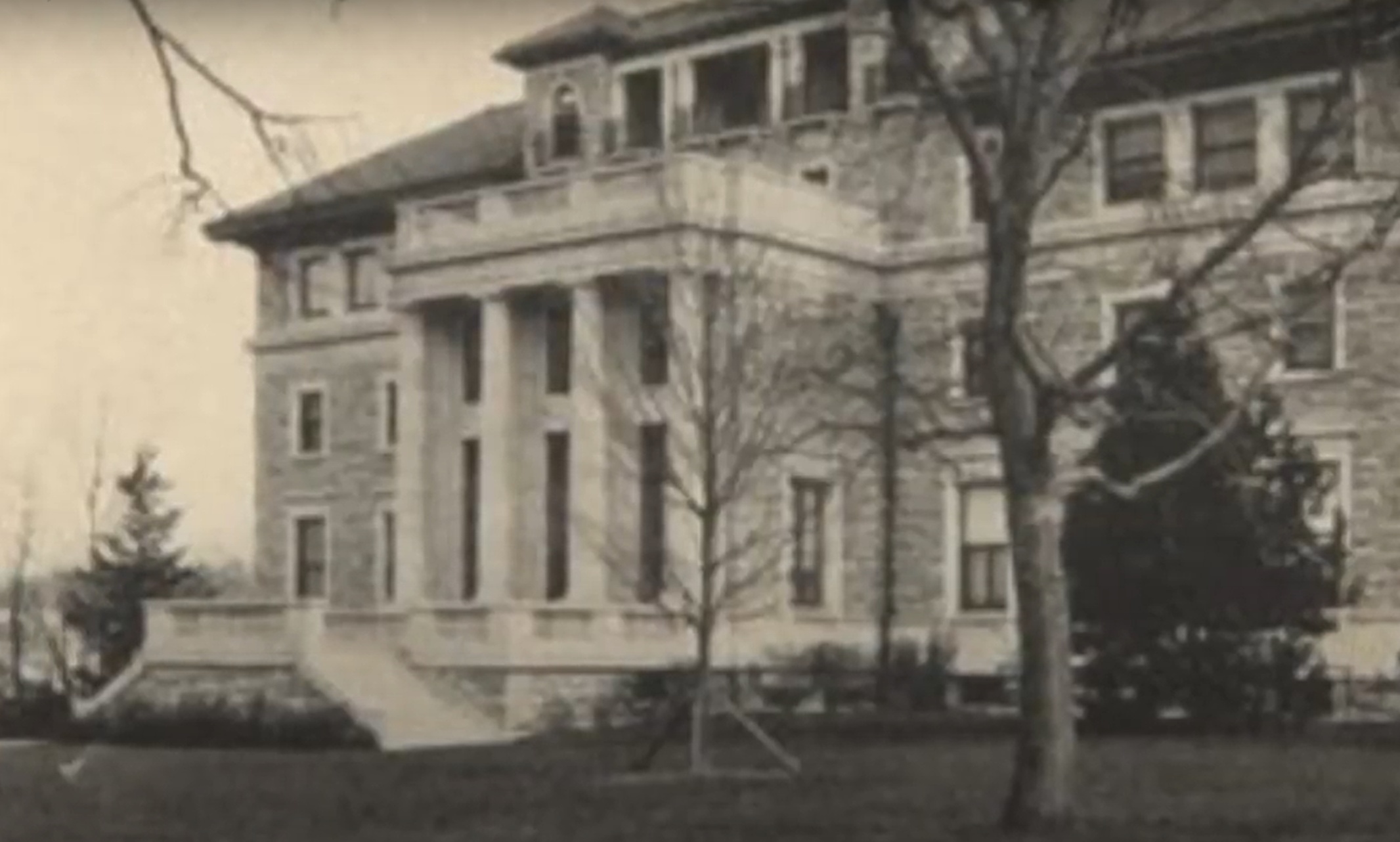
Chris Wolff shares his research on UMKC through the decades
Whether you're a new student to campus or a seasoned employee, you're bound to learn something new from this new campus history tour video series.
Chris Wolff, general merchandise manager at the UMKC Bookstore, will give a little background to the history of UMKC and help you see campus in a new light. Check out the videos for the campus locales you visit regularly or take your buds and phone along and give yourself a guided walking tour of campus. Once you know the history behind it, you’ll never be able to look at it the same way again.
Start with this video below of Volker Campus history.
Then check out these videos in the rest of the series:
Scofield Hall
Haag Hall
Haag Hall - Second Floor Murals
Haag Hall - Third Floor Murals
Royall Hall
Law Building
Swinney Center
University Playhouse
Gateway Sculptures
Atterbury Student Success Center and Pierson Auditorium
Sep 16, 2020
-
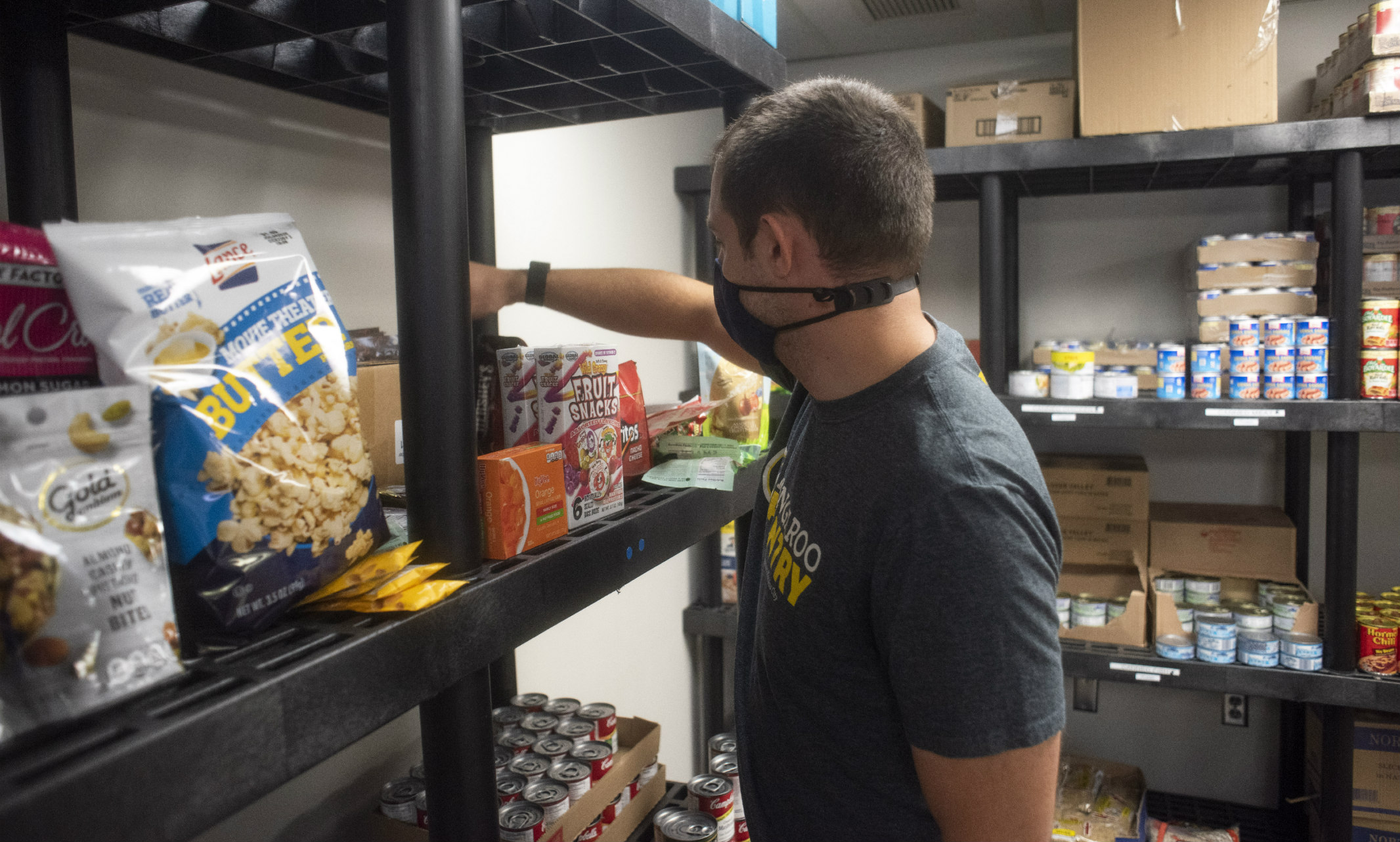
Recent updates to the pantry include fresh produce and client choice model
Two years ago, the U.S. Department of Agriculture reported that 11% of Americans experienced food insecurity. Since COVID-19, that number has doubled. And our UMKC Kangaroo Food Pantry is observing the same uptick in need this year.
The Kangaroo Food Pantry strives to provide food assistance for Roos in need, including students, faculty and staff.
“We had a lot of issues with COVID,” a recent pantry visitor shared. “A lot of unexpected expenses came up as a result. The Kangaroo Pantry has helped me overcome that.”
Anthony Maly, senior program manager, says historically the food pantry was distributing about 500-800 pounds of food per month but from March through August this year, they’ve given out more than 6,000 pounds.
Maly estimates the monthly need for food to be around 1,200-1,500 pounds for the duration of the semester and likely into 2021.
The pantry opened in 2015, after UMKC staff members learned of students in need of food assistance. Since then, the pantry has seen some changes, including the addition of fresh produce and a new refrigerator and freezer that will soon house meat and dairy items. The pantry has also switched to a “full client choice” model that allows individuals to pick their own food off the shelves. A majority of these changes stem from a food security task force created by Chancellor Agrawal to examine the needs of the campus community. The task force also completed recommendations for long-term expansion of the food pantry that will enable more students, faculty and staff to take advantage of the resources.
“We had a lot of issues with COVID. A lot of unexpected expenses came up as a result. The Kangaroo Pantry has helped me overcome that.” — Recent pantry visitor
How to receive assistance from the Kangaroo Food Pantry
If you are a UMKC student, faculty or staff member who needs food assistance, bring your university ID and you can shop for food during the pantry’s open hours, see below. Masks or face coverings are required and a limited number of individuals can be in the space at one time. Maly says they are frequently sanitizing high-touch surface areas to ensure the pantry is clean and safe for all visitors.
Tuesday: 1:30-5:30 p.m.Wednesday and Thursday: 1-5 p.m.
4825 Troost Ave.Room 103Kansas City, MO 64110
Roos are eligible to pick up 20 food items once a week, with a maximum of five proteins. Fresh produce doesn’t count toward the 20 items. If you’re unable to visit the pantry during these times, contact kangaroopantry@umkc.edu for other arrangements.
Sam Weis, graduate assistant at the pantry, stocks new food arrivals on the shelves.
How to support the Kangaroo Food Pantry
If you’d like to donate food to the pantry consider the most needed items below. Due to COVID-19, the pantry has been unable to hold food drives, but Maly says they are working to coordinate drives for the fall semester.
Items currently needed:
Canned chicken
Mac and cheese
Ramen
Canned vegetables
Monetary donations are important so that additional food can be purchased for the pantry, if you’d like to make a financial contribution click here.
Another way to support the Kangaroo Pantry is to participate in the UMKC Virtual 5K, Oct. 4-11. Registration is $25 and all proceeds support the pantry.
Learn more about the Kangaroo Pantry
Sep 15, 2020
-
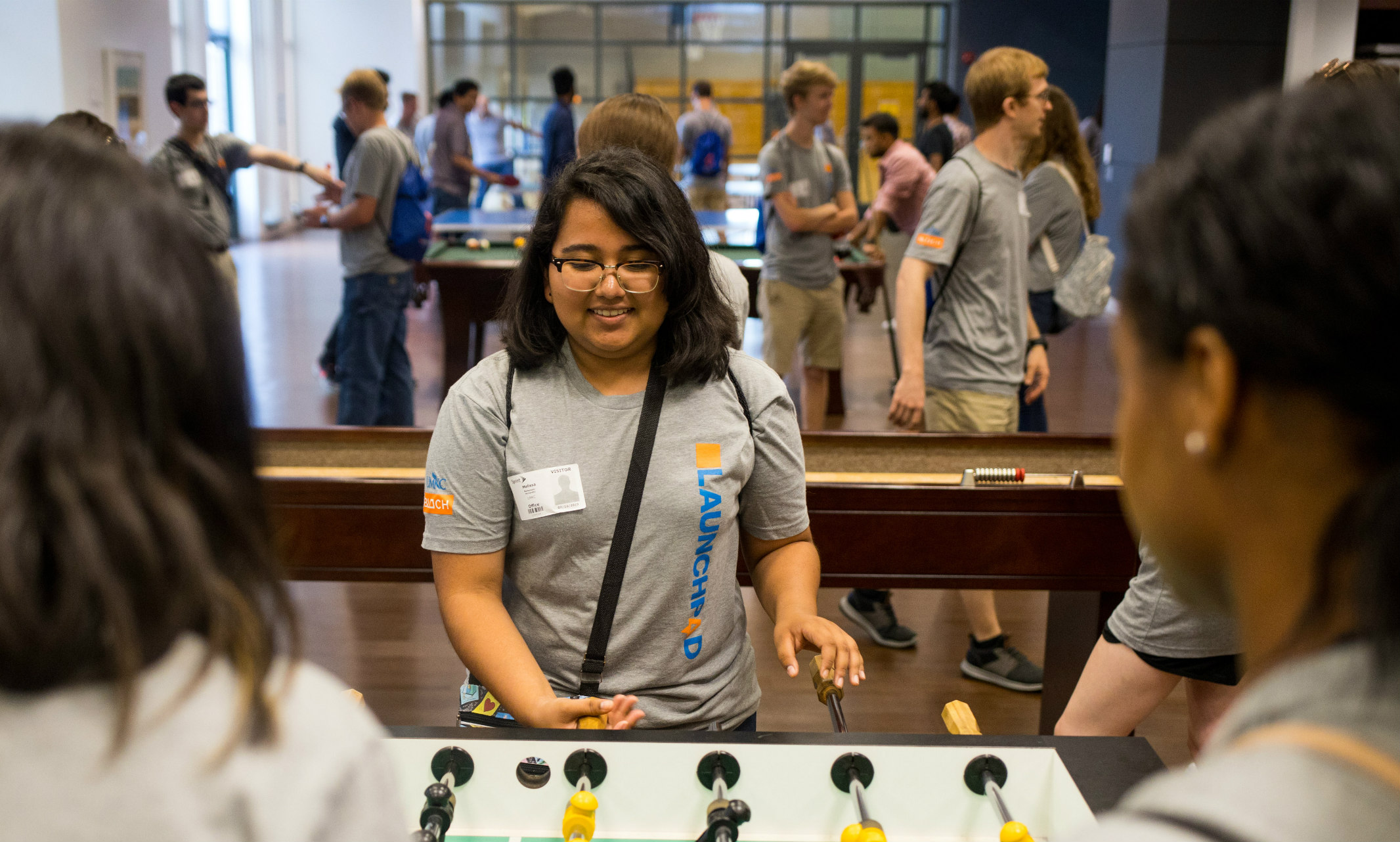
Hispanic high school students offered special programming, up to $10,000 in scholarships
The Hispanic community in Kansas City faces a 17-point college degree attainment gap compared to all other adults in the region. This means getting into and being successful in college can be a tough road ahead for students in this community. The University of Missouri-Kansas City is addressing the issue.
In an effort to close this gap, the Launchpad program at the Henry W. Bloch School of Management is teaming up with the Greater Kansas City Hispanic Development Fund to help provide a pathway for Hispanic students and their families as they prepare for college.
This partnership brings tailored Launchpad programming – including professional development and leadership skills – and scholarship support to Hispanic students planning to join the Bloch School. These opportunities and more will give students concrete skills to better stand out as they navigate college and prepare for their future careers. Scholarship support ranges up to $10,000 per year, when paired with a UMKC Automatic Scholarship.
As these high school students become Bloch Launchpad Scholars, they will continue to benefit by gaining exclusive access to additional coaching, professional development, leadership advising and professional networks – setting them up for a bright future.
How to Apply
Apply to UMKC and gain admission to study Business (B.B.A.), or Accounting (B.S.A.) no later than Nov. 15, 2021, (for Spring 2021 admission) or April 1, 2021 (for Summer/Fall 2021 admission)
Complete the Bloch Launchpad Application by Nov. 15, 2021, (for Spring 2021 admission) or April 1, 2021 (for Summer/Fall 2021 admission)
Submit official high school transcripts and ACT/SAT scores (high school students only) or submit official college transcript(s) (transfer students and/or high school students with dual-credit)
Sep 15, 2020
-
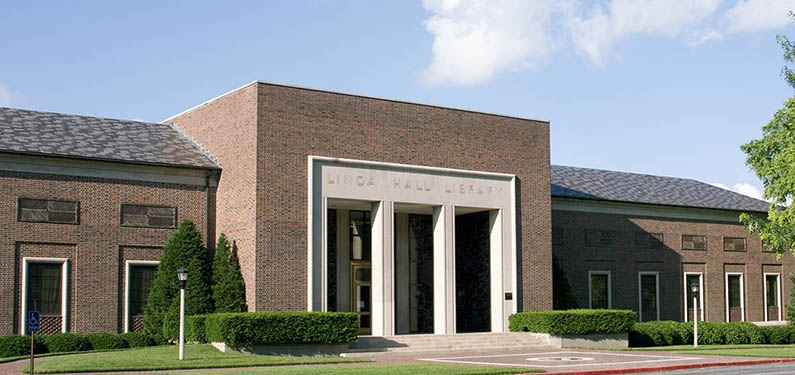
Curators’ Distinguished Professor supports Kansas City scholars
Jeff Rydberg-Cox, Ph.D.,Curators' Distinguished Professor in the UMKC English Languages and Literature Department, is the first-ever Scholar-in-Residence at the Linda Hall Library.
Located at 5109 Cherry Street next to the University of Missouri-Kansas City campus, the Linda Hall Library is an independent research library devoted to science, engineering and technology. This newly-established position provides support for scholars in the Kansas City metropolitan area whose research would benefit from sustained engagement with the library’s collections.
Jeff Rydberg-Cox, Ph.D.
“Linda Hall Library is full of treasures, and it has amazing collections covering science, engineering and technology with a spectacular history of science collection,” said Rydberg-Cox. “I was so happy that the library gave me the opportunity to spend an uninterrupted stretch of time working with their collections.”
As scholar-in-residence, Rydberg-Cox used his experience in digital humanities and put it into practice. One way he did that was through lectures, such as the virtual presentation on July 30, “Modeling the Sources and the Topics of Pliny’s Natural History.”
Gaius Plinius Secundus, called Pliny the Elder, was a Roman author. He wrote Naturalis Historia, which became an editorial model for later encyclopedias. In the July lecture, Rydberg-Cox discussed the nature of Pliny’s work, how other scholars and editors have tried to make the work more manageable and the ways that network analysis and other quantitative approaches can help people understand the sources that Pliny used.
“I am very excited to start developing projects with the students in my digital humanities seminar and my course on methods for digital publications,” said Rydberg-Cox. “I have a long wish list of other works in the History of Science Collection that I would like to study and integrate into my classes, such as a 1522 printed edition of Natural Questions by Seneca the Younger, a near contemporary of Pliny, a 1472 printing of Appian’s history of the Roman civil wars, a 1515 edition of Lucretius’ On the Nature of Things, and the library’s six editions of Vitruvius’ work on architecture from the 16th and 17th centuries.”
Rydberg-Cox started at UMKC during the 2000-2001 academic year. He teaches courses on ancient literature, digital humanities and representations of the ancient world in film. His research is on methodologies for digitizing texts and other materials in the humanities, multispectral analysis of manuscripts and early printed books, statistical analysis of Ancient Greek texts and applying techniques from the field of network analysis to literary texts.
Sep 15, 2020
-
The Journal of Blacks in Higher Education reports on the new Race, Ethnic and Gender Studies Department
The University of Missouri-Kansas City announced it is combining its Black studies, Latin American studies and women’s studies programs into a new academic department. Read the full article.
Sep 15, 2020
-
NBC News taps UMKC professor for comment about Kansas City crime statistics
Ken Novak, professor of Criminal Justice and Criminology, said that while the statistics are encouraging, crime typically ebbs and flows. Read the article on the NBC News website.
Sep 15, 2020
-
KCUR explores food insecurity, includes college students in discussion
Anthony Maly, senior program manager at the UMKC Office of Student Involvement, was a guest on Up to Date.
Sep 15, 2020
-
UMKC School of Law professor represents Eaton
Dale Wayne Eaton’s attorney, University of Missouri-Kansas City law professor Sean O’Brien, had argued his client had the right, pursuant to the Fifth, Sixth and 14th amendments to the Constitution, to have a defense lawyer present at any state-ordered competency. The story from the Casper Star Tribune was picked up by The Billings Gazette and The Sidney Herald.
Sep 14, 2020
-
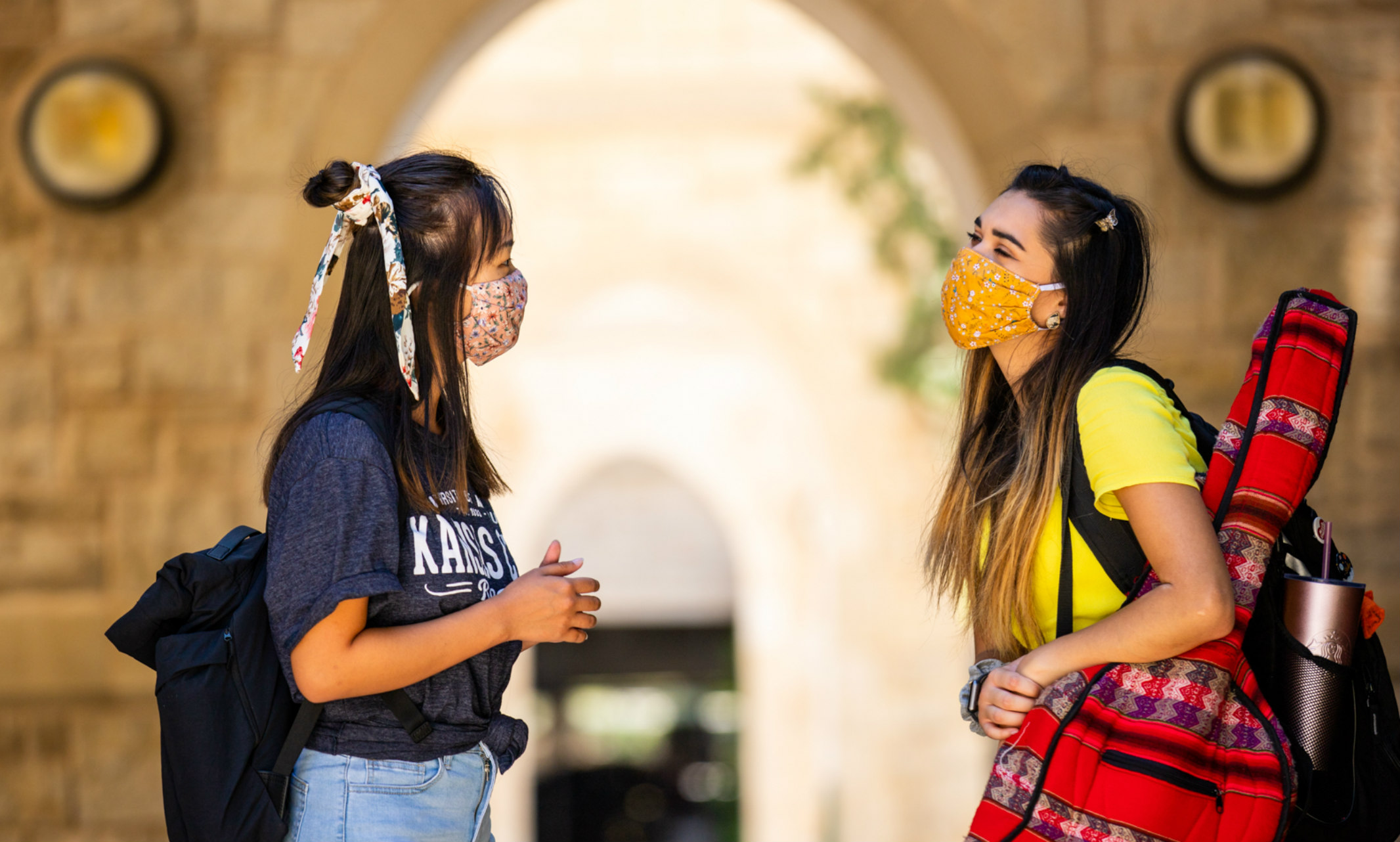
Photos show the new normal at UMKC as classes get underway
We were excited to welcome our Roos back to campus!
The beginning of the fall semester looked different this year, but Roo pride was still felt all throughout UMKC. We welcomed back students with a socially distanced parade, virtual Week of Welcome events and much more. With many safety precautions in place, our students were able to connect with one another and make a strong start to the semester. Here are a few photos that highlight our return to campus.
Sep 11, 2020
-
USA Today taps assistant professor
“You call 911. You need an ambulance. You can’t really shop around for it,” said Christopher Garmon, an assistant professor of Health Administration at the UMKC Henry W. Bloch School of Management who has studied the issue. Read the full article.
Sep 11, 2020
-
National Geographic interviews UMKC College of Arts & Sciences professor
Tina Niemi, a geologist at the UMKC Department of Earth & Environmental Sciences who was not involved with the Tel Kabri project, agrees that the evidence seems to point to an earthquake, though she says more research is needed to determine exactly where it originated. Read the full article.
Sep 11, 2020
-
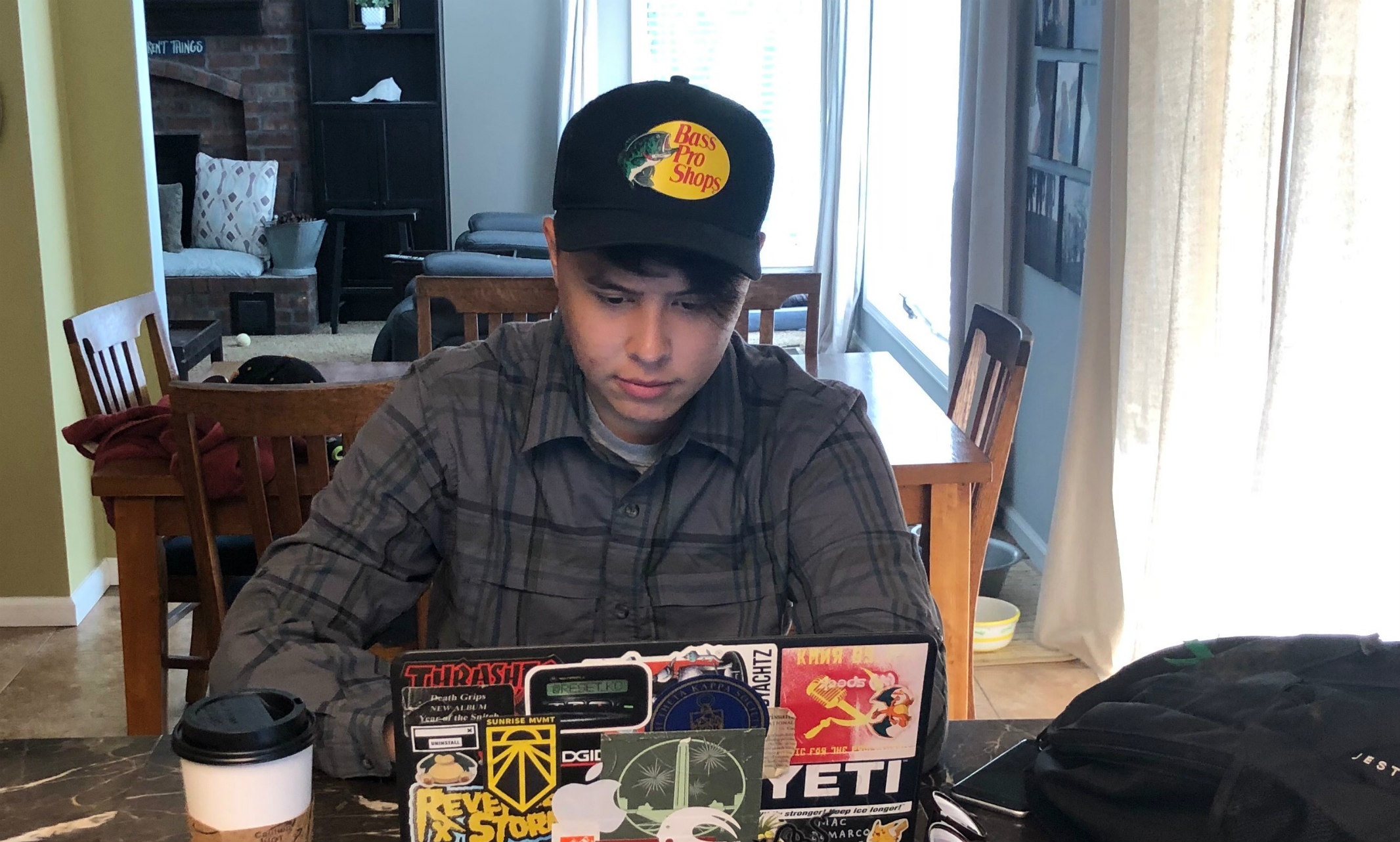
Grant Verhulst shares his internship experience
Most Missourians are familiar with the Mark Twain National Forest, and many have even seen it in person. Imagine getting to look at it from space. That is precisely what UMKC Environmental Science student Grant Verhulst spent his summer doing.
How did you first discover the NASA DEVELOP Program?
This internship was introduced to me in my environmental science program. My mentor, Dr. Jejung Lee has had two of his former students participate in it as well. It is a great opportunity for students in the environmental sciences field because this program facilitates research projects to address environmental concerns all across the country.
What excited you most about conducting environmental research with NASA?
I applied directly to a project involving the Mark Twain National Forest. I have always been interested in it, having camped and gone hiking there many times. This internship also gave me a great picture of what my future career could look like. Collaborating with NASA and other environmental agencies is exactly what I hope to be doing someday. I also really enjoyed partnering with my three other research participants on this project. We were a mixed team of undergraduates and graduate students so I gained useful insight into what my next steps could look like as a researcher.
COVID-19 has obviously made a huge impact on in-person experiences. What was it like conducting research remotely all summer?
Our main task was to utilize remote sensing using satellites produced by NASA to conduct feasibility studies. We wanted to see if it was possible to identify and track an invasive species of trees with satellite technology. While our research was possible to conduct from home, I did miss the energy that comes from sharing lab space with other researchers and having free flowing ideas and exchanges.
Photo by Missouri State Parks
What were the biggest benefits of interning for NASA?
The networking aspect of the internship was hugely beneficial. I got to speak with a lot of government employees in various agencies and practice having scientific conversations with non-scientists. I also learned how to create a lot of scientific materials like posters, presentations and papers. These are skills that any researcher needs to have.
"UMKC is filled with opportunities, especially in the environmental sciences field." – Grant Verhulst
How did being at UMKC help you get to this place in your academic career?
UMKC is filled with opportunities, especially in the environmental sciences field. There is also a lot of environmental action going on around this region, so opportunities abound. UMKC provides students the opportunity to conduct undergraduate research which I believe helped me get accepted into the DEVELOP program in the first place.
"Try everything. Environmental science is such a broad field with so many opportunities. You could get really deep into the science aspects and focus on lab research." – Grant Verhulst
What advice would you give to a younger student?
Try everything. Environmental science is such a broad field with so many opportunities. You could get really deep into the science aspects and focus on lab research. You could also work on climate justice and public policy or local regulations. If you take opportunities and explore everything you can figure out what you like doing the most. My internship with NASA is a great example of that. I am now one step closer to finding my dream career because of my time in this program.
Sep 10, 2020
-
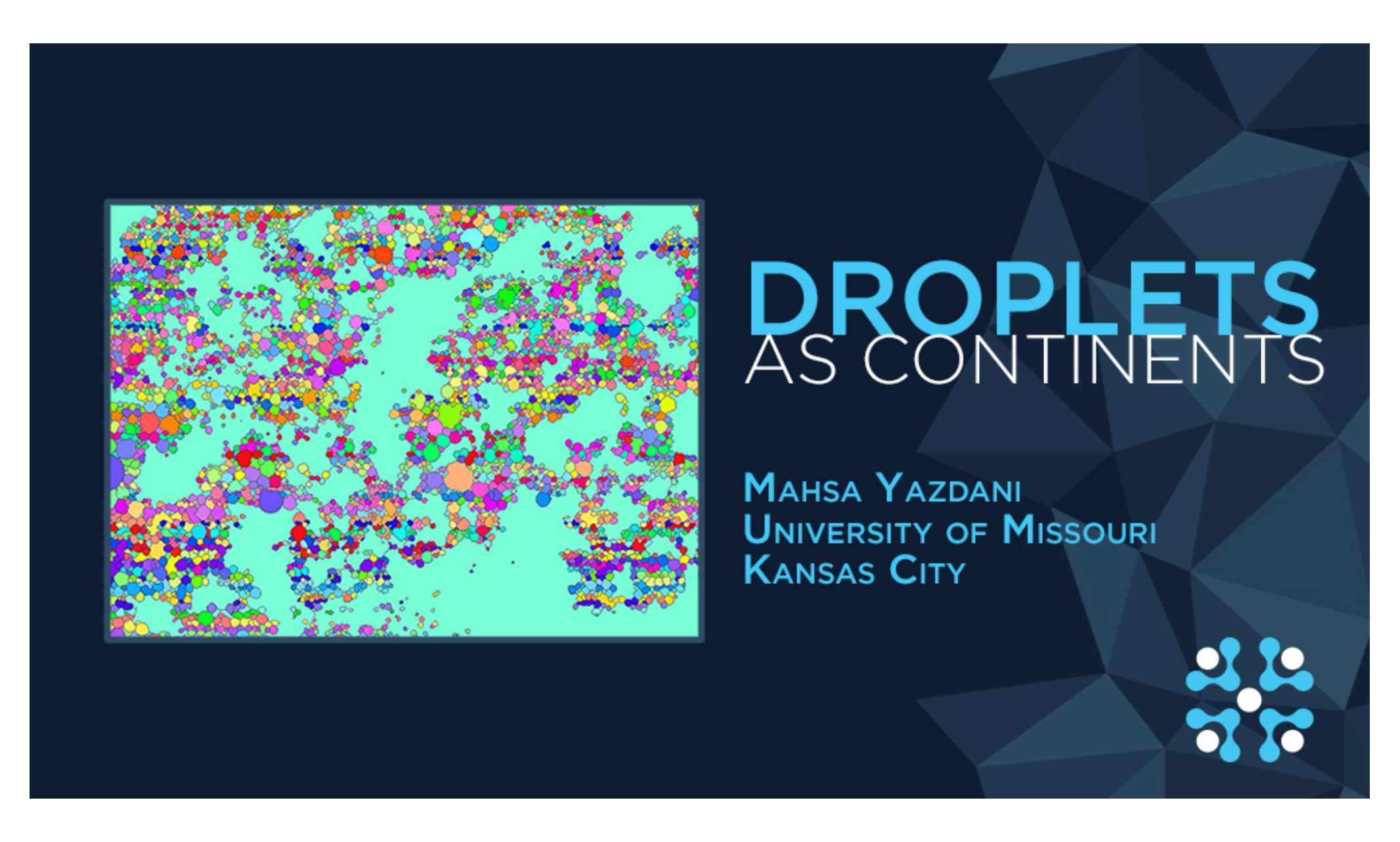
Mahsa Yazdani’s ‘Droplets as Continents’ chosen for annual BioNexus KC Science2Art event
Many of us don’t often view science as art. When we think of art, we see something abstract, something, maybe, with pretty colors, that's nice to look at or think about. That was until the introduction of arts into science, technology, engineering and math fields – STEAM.
Mechanical engineering doctoral student Mahsa Yazdani created an artistic digital imaging piece from her research that landed among the 12 featured visual works currently up for sale in the annual BioNexus KC Science2Art auction.
Science2Art is a platform for regional scientists to display and describe their research through the visual arts. Each of the images tells a personal research story and poetically captures the fieldwork performed by the scientists and their teams. Yazdani, under the direction of assistant professor Zahra Niroobakhsh, Ph.D., is part of a research team studying if non-toxic food-grade surfactants can be used to prevent environmental damage as a result of crude-oil spills.
As the only UMKC student to have their work included in the BioNexus KC art auction, Yazdani shared the inspiration behind her artwork, background on her research and the importance of incorporating art into science.
What influenced your interest in engineering?
I became interested in engineering while I was working on an application of engineering in biology. I noticed a combination of engineering and biology could affect human life in various ways, specifically by advancing our understanding of the environment and health.
What are your primary areas of research?
In addition to optimizing emulsions for oil spill remediation, I’m working on creating biomembranes using biocompatible surfactants through microfluidic systems for pharmaceutical applications.
How has UMKC helped to inspire and influence your research?
UMKC resources are key to my ability to continue several unique projects. Not only does UMKC give me access to other researchers’ scholarly work, but it also allows me to become acquainted with esteemed scientists who inspire me throughout my projects.
What do you hope to do with your degree when you graduate?
I am an interdisciplinary Ph.D. studying mechanical engineering and pharmaceutical sciences. I have always been interested in research – and becoming an effective researcher – learning new things and investigating. Walking on the edge of science fulfills my passion for solving problems to advance human health.
Why is it important to incorporate art into science?
I think art functions as a medium to expose people to the amazing, beautiful aspects of engineering. Without that exposure, everyone might not fully grasp how bold and astonishing science really is.
Droplets as Continents. Is this work based on an ongoing project?
“Droplet as Continents” is currently an ongoing project, and we are still working on that in the PRISM (Printing and Rheology of Interfacial Soft Materials) research group under the supervision of Dr. Zahra Niroobakhsh.
What is the inspiration behind your art?
When the BP oil spill happened in 2010, a large amount of crude oil leaked into the Gulf of Mexico. Several previous studies investigated the effects of this using various toxic surfactants to solve the problem. We are studying the effects of non-toxic surfactants on oil spill remediation. Droplets as Continents is a post-processing image from our preliminary studies, which displays several droplets covered with water in a similar way that continents are separated with water on the surface of the earth.
What are you learning from your research?
It has been documented that toxic surfactants have been used to amend oil slicks floating on the surface of the water during clean-up activities following an oil spill. As a member of the niROO PRISM Lab supervised by Dr. Niroobakhsh, I am studying the effectiveness of non-toxic food-grade surfactants to improve the effects of a similar environmental disaster. So far, we’ve done several preliminarily studies and hopefully, these non-toxic surfactants are just as effective as toxic ones, only without resulting in additional damage to the environment.
You are the first student to have their art included in the Science2Art auction. What does that mean for you?
I feel honored to have this special opportunity, and I’m glad that this platform helped me to contribute to fundraising for STEM education in Kansas City.
The current bid for Droplets as Continents is $350 on the BioNexus KC website. Images included in Science2Art were submitted by scientists from Columbia, Missouri, to Manhattan, Kansas. All proceeds from the Science2Art auction will be donated to STEAM education in KC.
Check out more UMKC Research
Sep 10, 2020
-
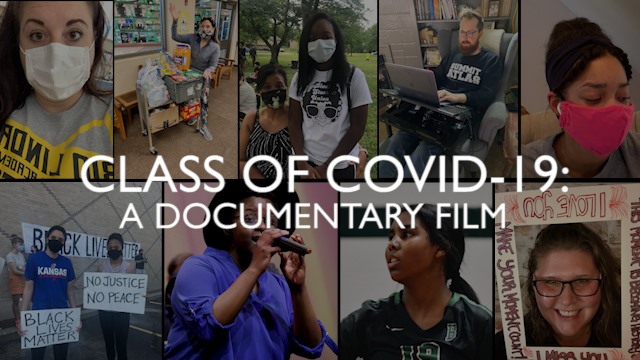
UMKC professor, Kansas City filmmaker team up to show experiences and emotions of students, teachers, families.
What do you do if you’re planning to make a documentary about teaching history in an age of disinformation, but history itself takes a big turn?
If you’re Donna Davis, Ph.D., a professor in the UMKC School of Education, you go with the more urgent story: How are the students, teachers and parents of the “Class of COVID-19” reacting to their new reality?
“This was supposed to be a small research project,” Davis said, “interviewing maybe four or five teachers about what it means to teach U.S. history with Twitter, Instagram, TikTok and other streams of information constantly feeding into their students’ worlds. I wanted to know how these teachers helped students understand what is fact and what is fiction.
“When the pandemic hit, it was clear that the film needed to adapt, adjust and make room for additional conversations.”
Fortunately, Davis already had Kansas City filmmaker Jon Brick on board. Davis’ work on the historical and social foundations of education typically appears in scholarly journals and books, but she thought filmed interviews would bring her new project to life.
“You’ll see both students and teachers express their real outrage about so much of what is happening.”
— Donna Davis
“I researched several professional directors in the area, and Jon stood out,” Davis said.
Brick’s credits include documentaries, original online video, and film and social media content for clients including Yahoo! News, People, Oracle, Getty Film and “60 Minutes.” Most relevant to Davis’s project was Brick’s 2018 documentary, “Uncommon Allies,” which told the extraordinary story of Rosilyn Temple, a Kansas City woman who responded to her son’s murder in 2011 by becoming an activist for reducing violence and improving police-community relations.
“Jon’s commitment to telling stories that are founded in social justice was important,” Davis said. “And his background in working closely with the Kansas City Police Department and community members on “Uncommon Allies” made this transition very smooth. We were able to ask very difficult questions of our interview subjects, and they were so very open and willing to share. You’ll see both students and teachers express their real outrage about so much of what is happening.”
Now, they have done more than 60 interviews, with more in store as schools and families continue to adapt to the pandemic, the explosion of protests over shootings by police, and other developments.
“This is an unfolding story, and the end hasn’t been written yet, unfortunately,” Davis said. “We continue to collect stories and get a look at just how devastating this has been for so many people.”
Davis said she already had learned how much people want to tell their stories and be heard, how powerful the stories of young people are, and how much they want social justice and social change.
“This is the Class of COVID-19, all of the participants on a terrible journey who took the time to share their lives with us.” — Donna Davis
Though they are staying flexible, Davis and Brick currently are hoping to produce a one-hour documentary by next summer or fall.
“As we thought about it, we wanted to capture the initial reaction to the pandemic, the various touch-points along the way, and then, hopefully, a look at the resolution of this nightmare, when a vaccine or solid treatment is in place,” Davis said. “This is the Class of COVID-19—all of the participants on a terrible journey who took the time to share their lives with us.”
As for distribution, Brick said, “We’ll submit the film to a number of film festivals as a feature documentary. We’ll work with some distribution partners to get the film out on streaming services such as Netflix, and possibly PBS or other television outlets. We also will do a social impact campaign and use the film for educational purposes.”
Davis and Brick are working with the International Documentary Association to gain fiscal sponsorship and 501c3 status, allowing foundations to contribute to the production of the film. They also have a crowdsourcing campaign underway with Indiegogo where anyone can support the project.
“People need to know that this is a project designed to illuminate the voices of the pandemic and all that took place during this awful time,” Davis said. “We don’t purport to have all the answers, but the questions are very clear and the emotion is raw.”
Sep 09, 2020
-
Faculty and staff training part of Roos Advocate for Community Change
UMKC people are taking thoughtful action on campus and in our community to ensure lasting and comprehensive change through Roos Advocate for Community Change, a new campus-wide effort announced in June.
It is a significant component of the UMKC response to the tragic death of George Floyd and the vital national conversation on racism it has spawned.
Chancellor Mauli Agrawal is leading this effort, working with a broad leadership group of faculty, staff and students. Activity is comprehensive, with intensive work being done across campus. One such example is the commitment for mandatory professional development for all UMKC faculty and staff by the end of this calendar year.
Beginning Sept. 16, faculty and staff will be required to attend a virtual session of “Unconscious Bias, Microaggressions, and What to do About Them.”
The training will focus on understanding and identifying bias and microaggressions, how to mitigate them and how to respond when you see them carried out by others. The training will offer employees concrete examples of microaggressions, insights on how unconscious bias influences decision-making, interactive conversation and breakout groups. Managers and supervisors will attend similar sessions with an expanded dialogue on how to address microaggressions and bias when it happens.
“I’m really excited for this training. We’ve known that it was needed and now is the time to make it mandatory,” says Susan Wilson, Ph.D., vice chancellor of the UMKC Division of Diversity and Inclusion.
Training sessions will be conducted via Zoom and last one hour and 15 minutes. There will be 36 sessions offered, with a maximum capacity of 60 people per training. Employees can sign up for the sessions directly through MyLearn.
University leadership attended a training earlier this summer with Andrea Hendricks, Ed.D., senior executive director of diversity and inclusion strategy at Cerner.
Professional development efforts are just one piece of Roos Advocate for Community Change. Other initiatives include the Critical Conversations series, virtual resource center and Troost to Prospect partnerships.
Sep 04, 2020
-
Kansas City community members continue dialogue around local control, use of force and future reforms.
The Future of Policing: Part 2 is the third discussion in the series sponsored by Chancellor Mauli Agrawal of the University of Missouri-Kansas City and the university’s Division of Diversity and Inclusion.
The second discussion focused on policing in the Critical Conversations series took place on Thursday, Aug. 27, and continued the dialogue around local control, use of force and future reforms.
Participating panelists included:
Gwendolyn Grant, president and CEO, Urban League of Greater Kansas City
Ronald Lindsay, pastor, Concord Fortress of Hope Church
Ken Novak, professor, UMKC Department of Criminal Justice and Criminology
Deputy Chief Karl Oakman, Kansas City, Missouri Police
Gary O’Bannon (co-moderator), executive-in-residence, Henry W. Bloch School of Management
Cynthia L. Short, trial lawyer, mitigation specialist and sentencing advocate
Jasmine Ward (co-moderator), third-year student, UMKC School of Law
Local control was top-of-mind since Mayor Lucas recently withdrew a measure allowing voters to weigh in on the issue. Grant cited the move as a wise one, saying that the people of Kansas City were not voting to establish local control or not, but only to have the city council make it a legislative priority.
Lindsay added that while the issue of local control is important, Kansas City would be better served by focusing on how we include communities, individuals and neighborhoods into the global policing strategy.
One way to offer community members insight into the police department is transparency, particularly around use-of-force techniques. Novak said that there is no greater disconnect between the police and public than what is considered a reasonable and unreasonable use-of-force. Partly because the public views use-of-force incidents through a larger, historical lens and partly because they don’t have access to or understand the police department’s existing policies and procedures. Some police departments – including Kansas City – make their policies available online to allow for greater transparency.
Another element that has been brought up nationally is the idea that police forces have “a few bad apples” and their actions aren’t indicative of the entire department. Unfortunately, as Short pointed out, framing the issue as a few bad apples is misleading to the public. Until everyone holds police accountable, including other officers, the situation will remain the same.
Sep 03, 2020
-
Fox4KC covers recent announcement of STEM funding
The National Science Foundation awarded UMKC $100,000 to support collaborative programming. Read the story from Fox4KC.
Sep 03, 2020
-
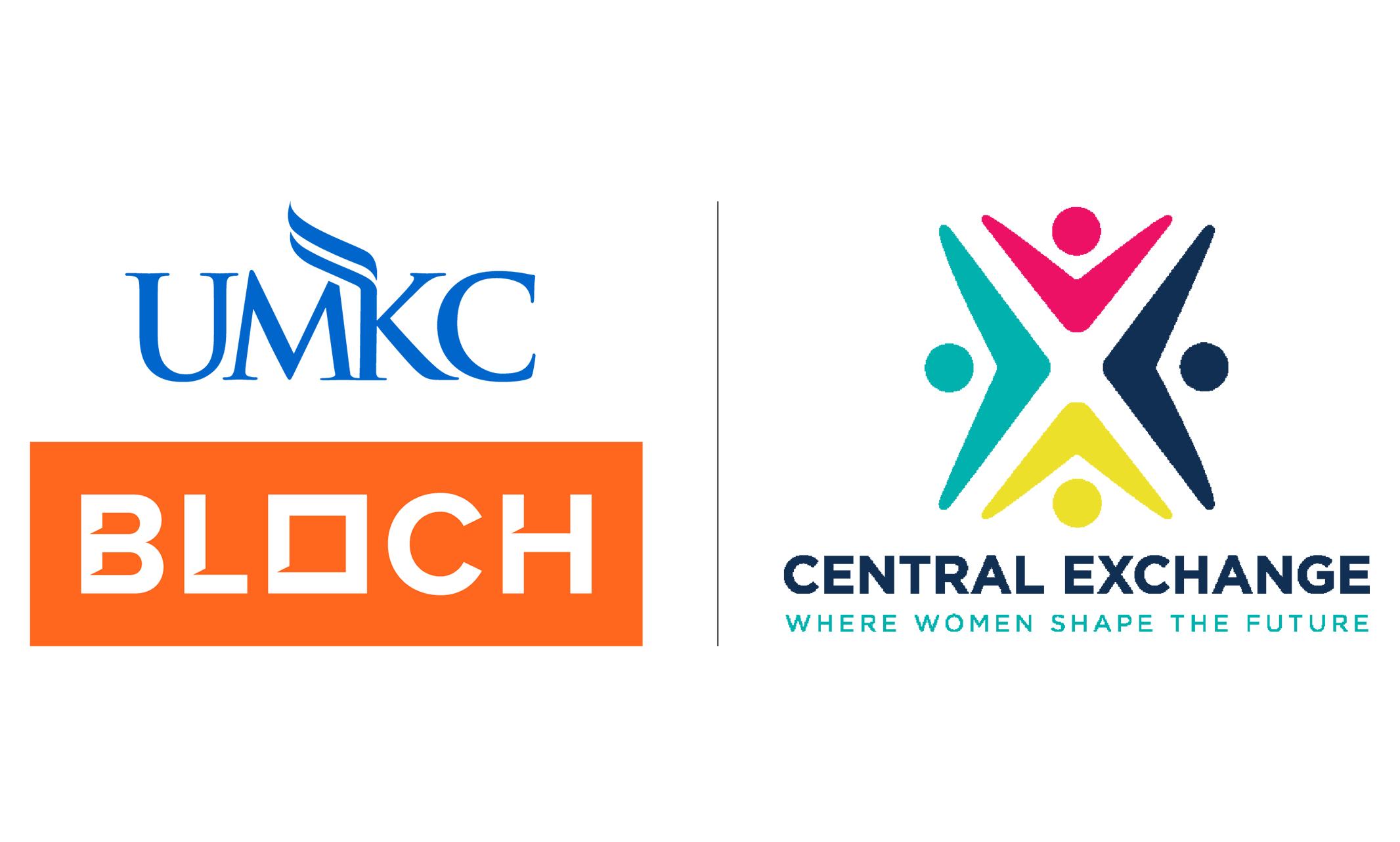
Collaboration will enhance networking and leadership development for women
Central Exchange has signed a three-year services agreement with the Henry W. Bloch School of Management at UMKC to further advance development of women by leveraging Bloch School assets to expand the reach, services and programming of Central Exchange.
Central Exchange, Kansas City’s community for women leaders, has signed a three-year services agreement with the Henry W. Bloch School of Management at the University of Missouri-Kansas City. The strategic and collaborative agreement will further advance development of women by leveraging Bloch School assets to expand the reach, services and programming of Central Exchange. The school will provide leadership and expertise for program design, delivery, and oversight of operations and events.
The agreement was effective as of Sept. 1. The Bloch Executive Education Center will be the new home of Central Exchange. Ann M. Hackett, Ph.D., chief learning and engagement officer for executive education, will lead day-to-day management of Central Exchange.
Hackett and other Bloch Executive Education faculty and staff will also work with the Central Exchange board of directors on strategic planning to find ways to expand the reach and enhance the experience of Central Exchange members and corporate partners.
“We are excited about the opportunity to work with Bloch and build on Central Exchange’s legacy through fresh new programming and expanded networking and development opportunities focused on advancing women, both professionally and personally,” said Ellen Fairchild, Central Exchange board chair. “Additionally, this will allow Central Exchange to streamline its overhead and help ensure its financial future. We want the Central Exchange to be here and relevant for the next 40 years.”
This year, Central Exchange is celebrating its 40th anniversary of being the premier women’s organization in greater Kansas City. With hundreds of members, Central Exchange represents the largest cross-section of women from throughout the Kansas City area. Members include business owners, entrepreneurs, executives, managers, nonprofit professionals, civic leaders and community volunteers.
“This agreement will allow both organizations to build on their long-term community relationships and expertise to accelerate women achieving their full potential,” Hackett said. “It is exciting to think about where Central Exchange can go with the Bloch engine powering its vital mission.”
Central Exchange is Kansas City’s community for women leaders. A women-centric organization that empowers and connects women across generations, industries and perspectives, promotes equity for women, ignites confidence in women and cultivates and accelerates women leaders. For more information go to www.centralexchange.org.
The Bloch Executive Education Center provides opportunities — including seminars, certificates, and custom programs — to help professionals and the organizations they serve promote innovative insights and business best practices.
Sep 02, 2020
-
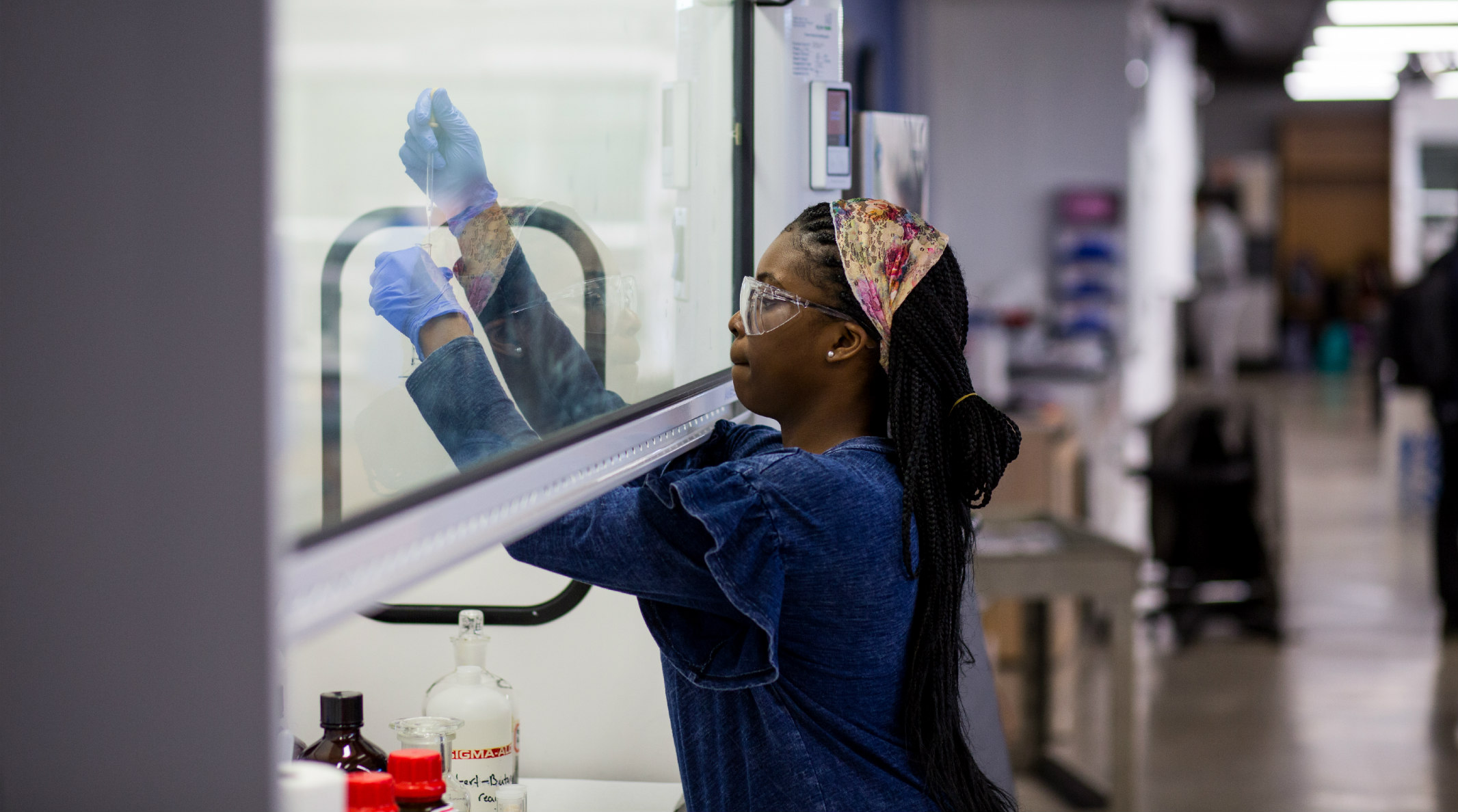
The National Science Foundation awards $100,000 to support collaborative programming
The National Science Foundation awarded the University of Missouri-Kansas City $100,000 to support the Integrating STEM Education Research Collaboration for Regional Prosperity.
The conference is designed to support researchers in science, technology, engineering and math education (STEM) as they collaborate to develop a regional STEM ecosystem that will identify challenges, opportunities and solutions to impact and educate the STEM workforce. The Integrating STEM conference will focus on professional development in conjunction with bringing together postsecondary faculty and administration, STEM communities and civic leaders to discuss the challenges of attracting and maintaining a diverse student pipeline that leads to graduation and career success, which fuels regional economic development.
Alexis Petri, director of faculty support and associate research professor, is the principal investigator for this project.
“We think it’s possible that focused professional development on new strategic tools and research driven initiatives will provide increased traction for students and regional prosperity.”- Alexis Petri
“Kansas City needs a more robust STEM workforce,” Petri says. “At UMKC, STEM faculty have been addressing this need. However, we believe a regional approach will bring increased urgency and collective impact to educating a skilled STEM workforce that meets employer demands.”
According to KC Rising, a business collaborative focused on accelerating regional growth, the Kansas City region outperforms its peers in STEM employment, but fewer students are graduating with STEM-related degrees than four years ago, especially among Black and Hispanic students.
“We think it’s possible that focused professional development on new strategic tools and research driven initiatives will provide increased traction for students and regional prosperity,” Petri says.
During the three-day conference, participants will discuss six topics critical to the Greater Kansas City STEM education research ecosystem:
Supporting student success in STEM majors by supporting intentionally inclusive educational research theories and practices
Transforming the first-year college experience – innovative educational technology and inclusive pedagogies for student learning and retention in STEM
Smoothing transitions from two- to four-year institutions – opportunities and challenges for institutional partnerships
Using high-impact practices to retain STEM majors and foster interest in STEM careers
Building coalition among stakeholders
Sustaining a multi-institution ecosystem in the Kansas City region including social and cultural inclusiveness for student success.
The conference is designed to encourage diverse viewpoints, the opportunity to engage with experts, and discuss the application of the presented information into real-world settings.
“Through the Integrating STEM education research efforts, UMKC seeks to promote collaboration among postsecondary institutions and community organizations to determine whether application of education research – existing and new – could support systemic, large- scale change,” says Chris Lui, Ph.D., vice chancellor of research. “These efforts ensure that UMKC is a regional stronghold for student learning, faculty and staff development and workforce production.”
To receive more information on Integrating STEM, including how to participate in the online conference, please contact Petri at petria@umkc.edu.
Sep 02, 2020
-
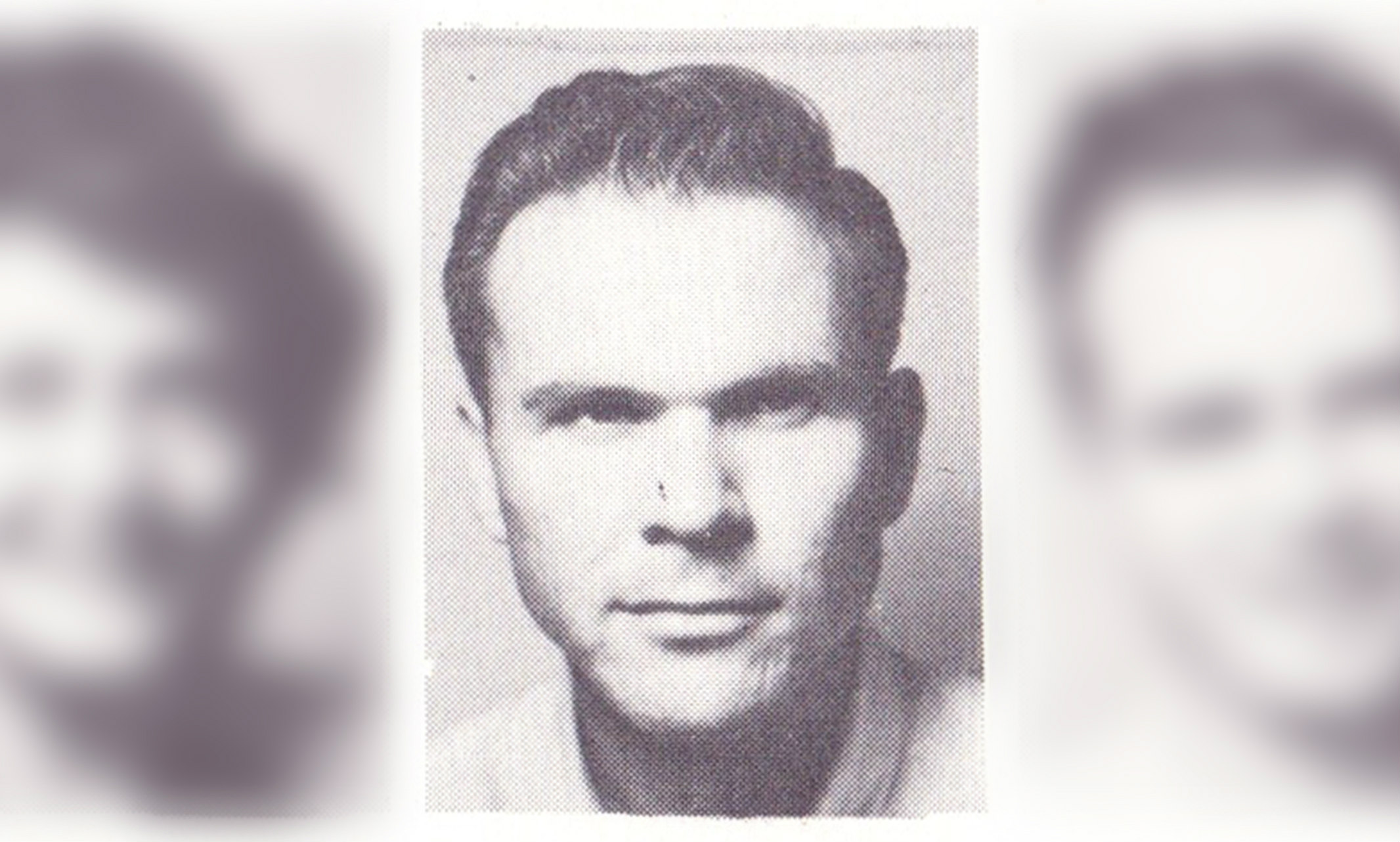
Kansas City businessman Albert Gerecht liked helping others succeed
Albert Gerecht, B.A. ’52, established his business, The Tax Gallery in 1956, one mile from his alma mater. After earning his degree and meeting his wife, Doris, he led a bold life making friends, building his business and supporting the community. Upon his death he bequeathed $400,000 for merit-based scholarships to further his commitment to helping people help themselves.
“Albert was one of kind,” Melanie Zeigler says. “I walked into The Tax Gallery 32 years ago looking for a notary and ended up with a job. It was his idea. You did not tell Albert ‘no.’”
Zeigler and Ken Baylie have co-owned The Tax Gallery since 1995 when Gerecht sold them the business.
Gerecht told Zeigler that he started the business selling insurance and went door-to-door selling policies. One day, a potential customer said that he couldn’t talk because he was working on his taxes. Gerecht had a quick reply.
“’My wife does taxes,’” Gerecht said. “‘Bring them down!’”
The Gerechts started their insurance and tax-preparation business on Troost Avenue, which is considered a racial and economic dividing line in Kansas City. Albert was committed to helping everyone who walked through his door.
“Albert loved his customers,” Zeigler says. “A lot of his clients were of color and he knew that they were often charged more at other places than white clients.”
“Albert was one of kind,” - Melanie Zeigler
In the 1970s, Gerecht sued multiple insurance companies under the Sherman Anti-Trust Act, which protects consumers from abuses, for red-lining.
“He didn’t win, but that was who he was,” says Albert’s son, Wolfe Gerecht. “He was always willing to do battle.”
In addition to his integrity, his family and friends remember him as a garrulous, quick-witted and intelligent man. He confided in them that he felt that because of his Jewish faith he experienced prejudice and mistreatment. As a result, he believed that an unbiased association with all people combined with the power of education could eliminate hatred.
Albert’s best friend, Art Kammerlohr, said his gift to UMKC to establish scholarships was intended to foster performance and excellence irrespective of need, but his substantial giving in other areas demonstrated his desire to help those less fortunate, foster education and to promote and support organizations that speak truth to power and protect individual rights.
The people who loved Albert remember him as garrulous, quick-witted and hard working.
“Albert loved people,” Zeigler says. “He would walk into a restaurant and say, ‘Hello, everybody!’ I learned a lot from him. He was a giving man.”
The Albert Gerecht Scholarship will fund five $10,000 scholarships annually until the funds are expended. For more information on scholarships, please contact Scholarships and Financial Aid.
Sep 01, 2020















